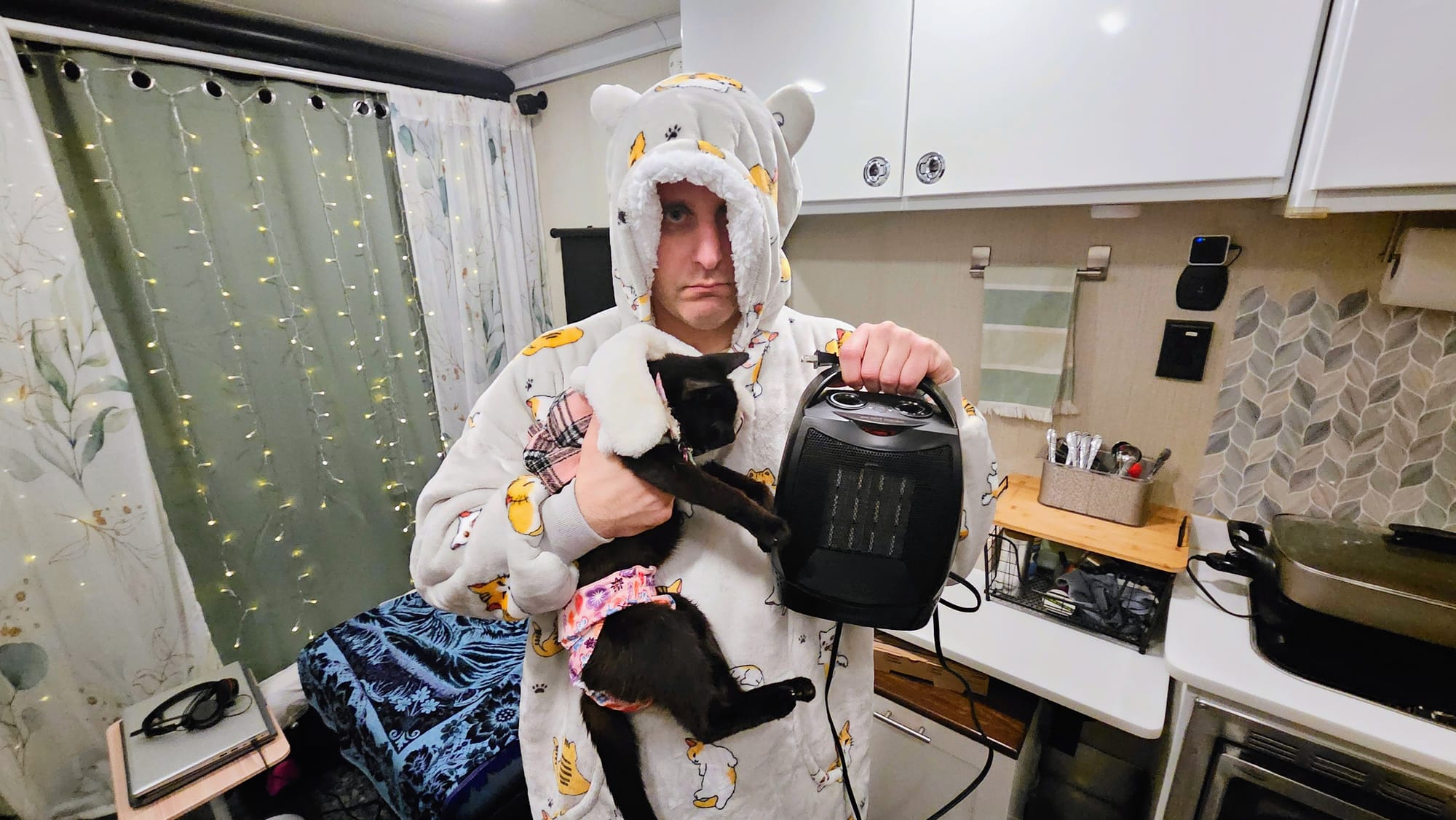Camping in cold fall temperatures...with no heat!
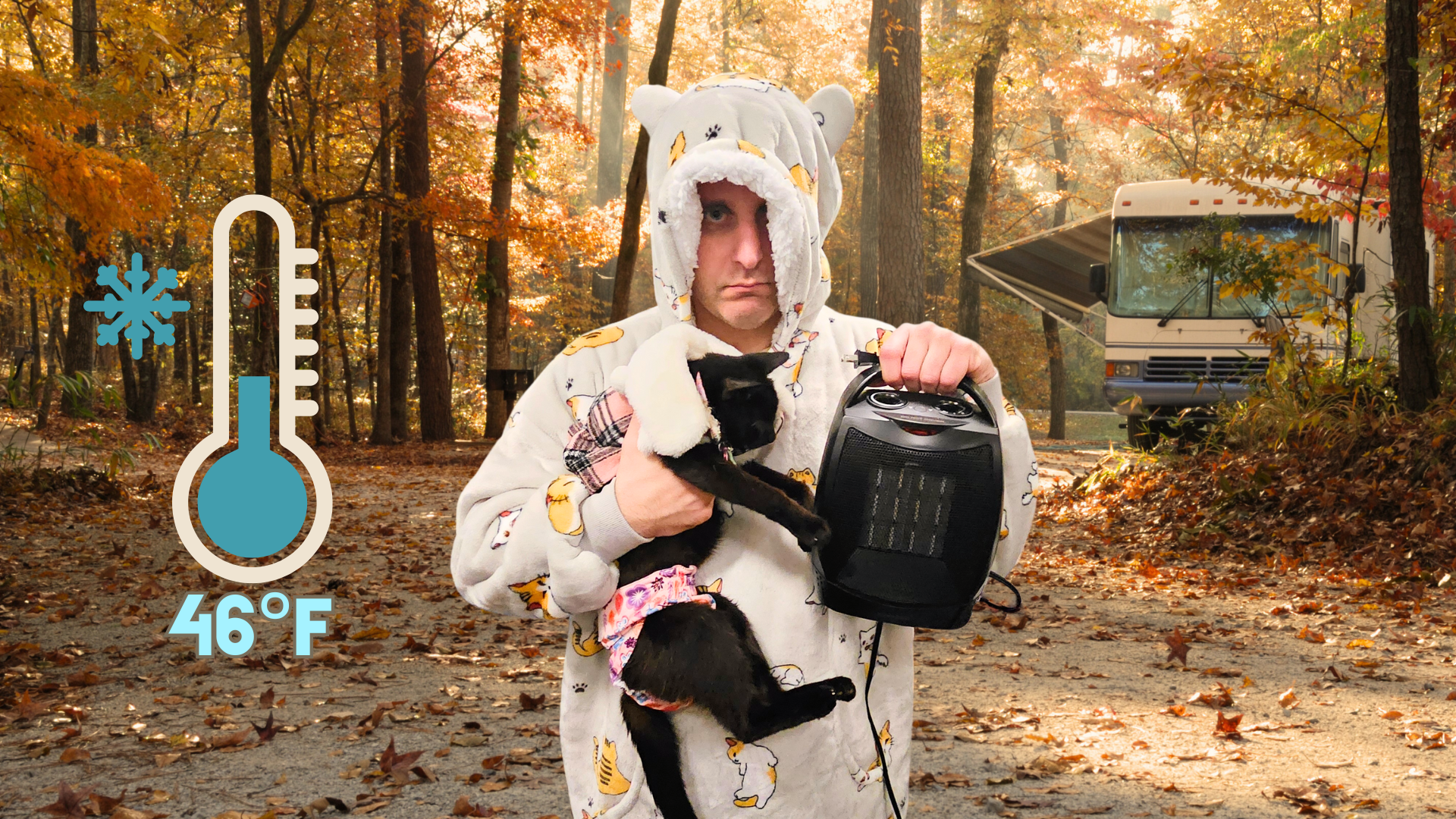
Fall is our favorite season to camp in our RV. We love how the campgrounds grow quieter with each passing week. We love feeling all warm and cozy when the air gets cool and crisp. We love watching the leaves change color around our campsites. This summer was hot and humid, and we had been counting the days until the seasons shifted. We caught glimpses in August as we finished up our Summer to Remember challenges.
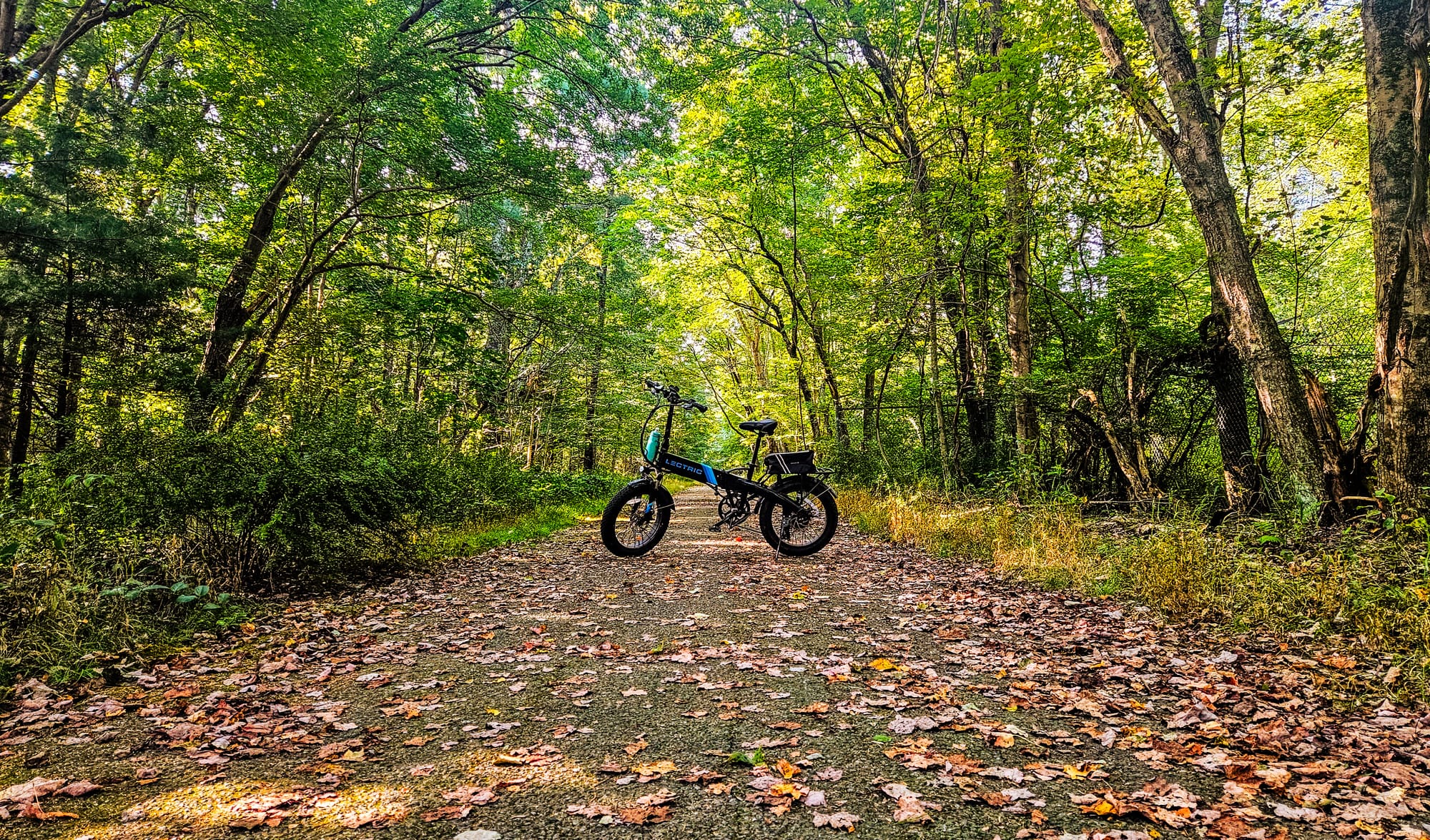
When the fall weather finally arrived, we were getting ready to head to one of the most beautiful places to enjoy the season: New Hampshire. We should have been excited, but one big problem plagued us: Temps in the state were already dropping to the 40s, even the 30s some nights, and we did not have a working furnace.
This year, we can track our furnace issues back to sometime during early spring. We had a few cold nights where the heat wasn't kicking on the way it should, but soon the temperatures rose and we ended up being more concerned about our AC than our heat. Then summer came and our furnace problems became a distant memory.
This wasn't the only time we had issues with our furnace, though. They actually date back to when we first moved into the RV. Let's cover the timeline.
Pre-launch, Winter 2021-2022:
We had several middle-of-the-night wakeup calls, where we realized our furnace had stopped running in the middle of the night. We were always surprised because based on our calculations and how heavy our propane tanks felt, we didn't think we should be out of propane. But, we had Gas Stops on our tanks that include gauges, and they were reading low.
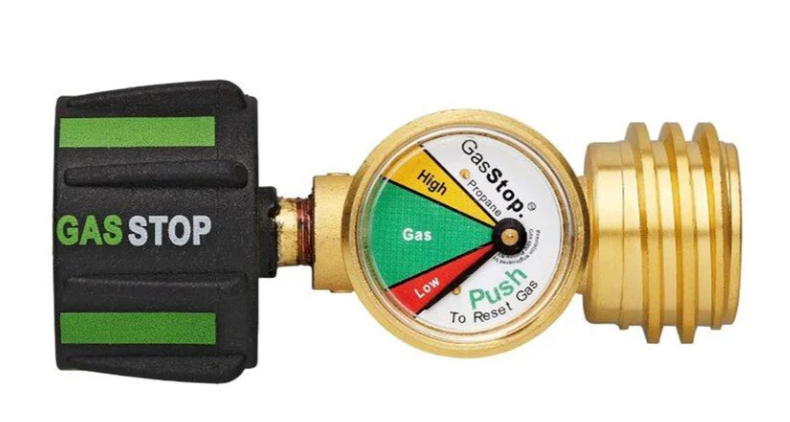
These incidents seemed to happen on the coldest nights. We seemed to need both tanks at least partly full in order to get working heat. Still, being that the temperatures were so low, we assumed that perhaps the furnace really was just guzzling propane. We were fresh newbs and didn't know our rig yet.
Late fall 2022:
We made it through our first year of RVing, and after a successful season 1 on the road, had returned to New England for the holidays. We spent early November in New Hampshire, where we had wonderfully cool weather and even got our first snow of the season!
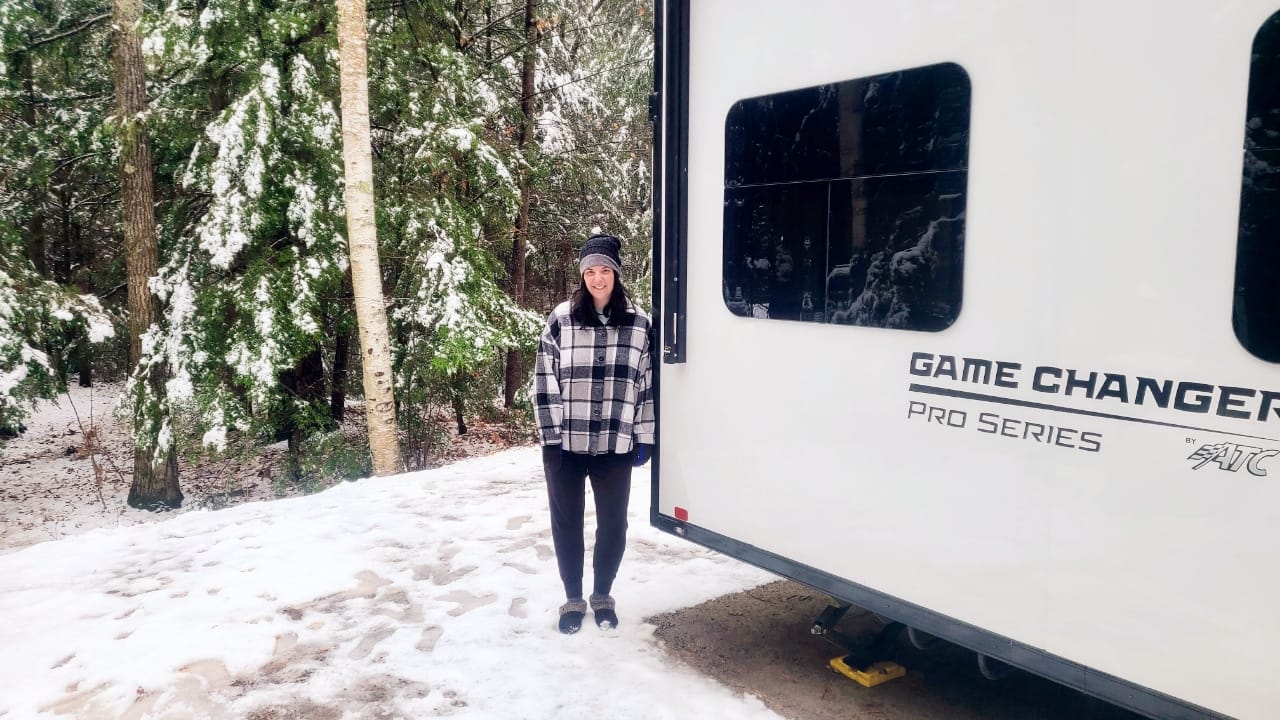
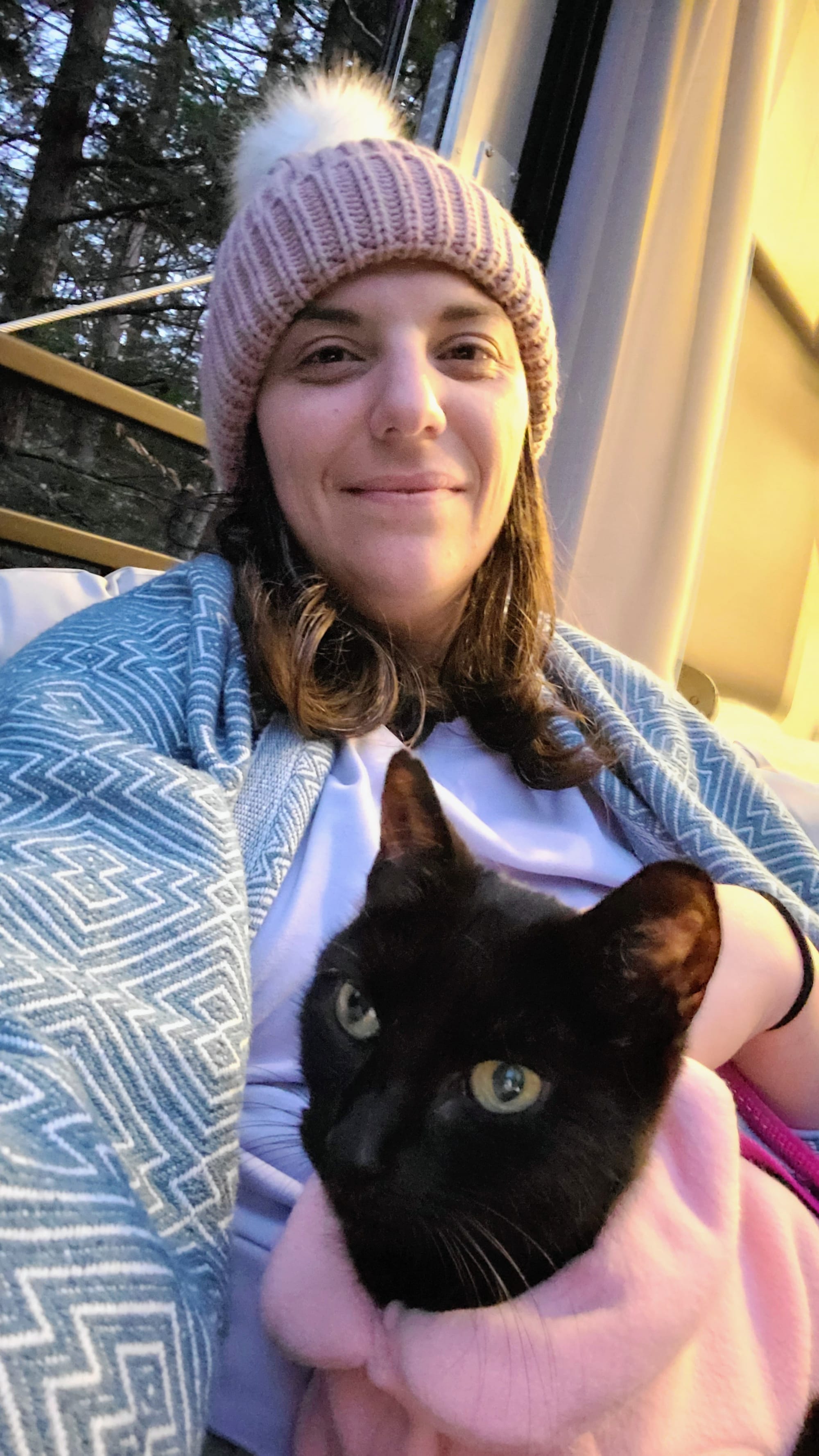
But, our furnace issues remained. We took notes for a while, but there seemed to be no pattern that would point us to a solution, other than it happened on cold nights. But cold nights are when we use our furnace the most!
2023:
At the beginning of the year, we headed to the deserts of the Southwest, where the temperatures dropped significantly at night. I thought I noticed a pattern then, where the furnace seemed to not light or short cycle whenever we got to a new campsite. Now, much more well-versed in the quirks of our RV, I spent more time troubleshooting. Sometimes repeated priming and restarting seemed to help. We thought maybe we had air in our lines, or perhaps something would happen during the bumps and unlevel ground during travel, despite the fact that we travel with our propane off. We also considered whether or not the furnace worked worse at higher altitudes, but it was happening in the desert, in the mountains, and near the coast.
Our propane is used for more than just our furnace. We have a propane-powered tankless water heater and a propane stove. However, we didn't seem to have issues with them the same way we had with our furnace. We did notice that oftentimes our water heater would struggle to get to the temperatures we set it to, or it would kick on and then off again. This happened mostly in cold weather, but we thought that maybe it just wasn't powerful. We had read online that this water heater is not the best. We also noticed issues when our water pressure was too low, but once again, we could explain it away by assuming that the water heater wasn't triggered by the low flow coming through.
2024:
This year forced us to stop making excuses. On the cold spring days when we needed heat, we could get it to kick on by priming the tanks. If that didn't work, sometimes setting our thermostat to a really high temperature, like 85°F, would jumpstart it. Other times, I would set it just above the current temperature and then raise it a few degrees at a time as the trailer warmed up. The furnace was on the fritz, and soon it stopped lighting at all.
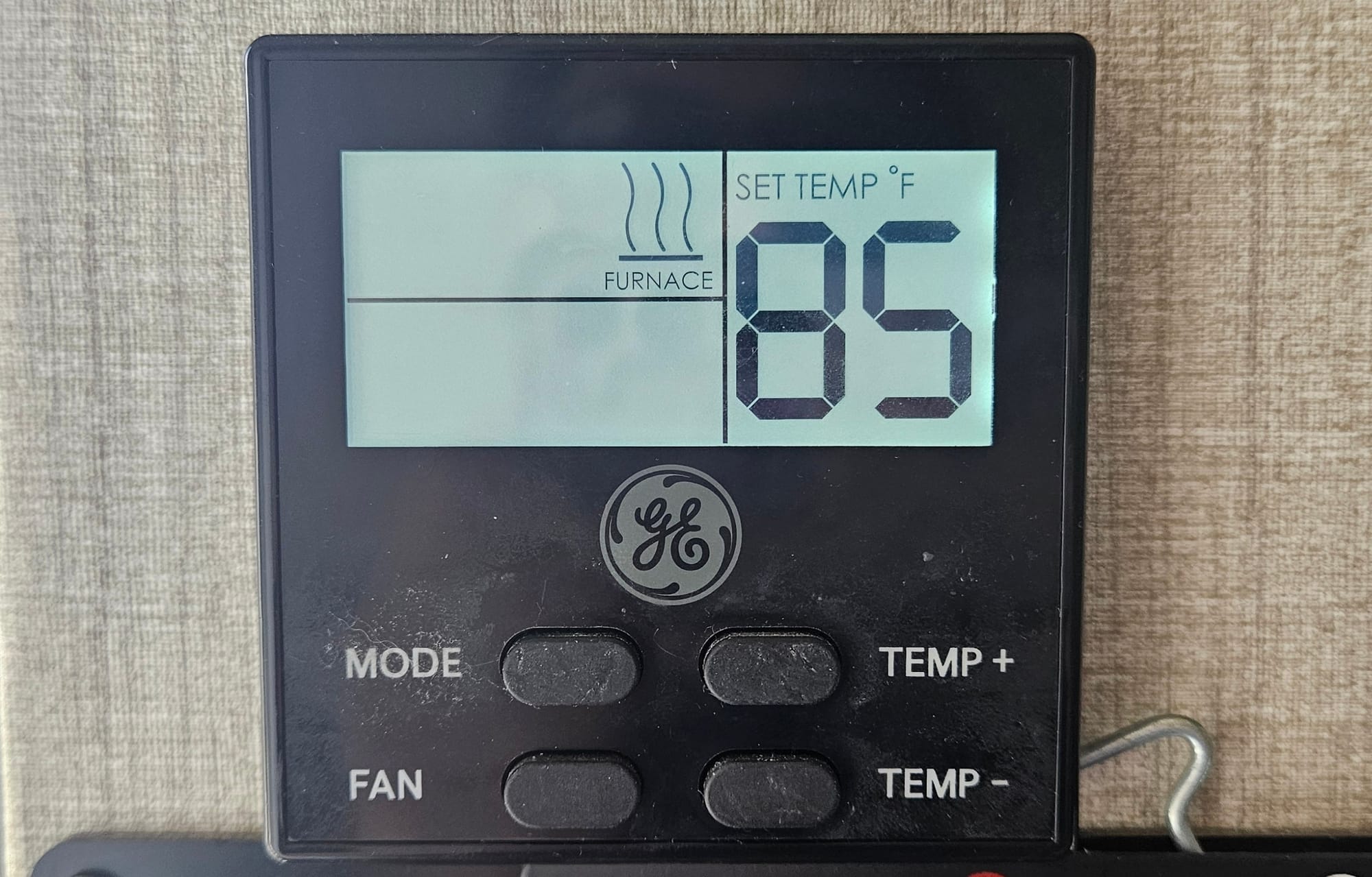
We added furnace troubleshooting/repairs to our always-long list of RV tasks, but we kept it at low priority due to the fact that summer was in full swing. It didn't stop us from noticing other propane-related problems, though. In late June, we noticed our stove burning weakly. The flame is supposed to be blue, but it was mostly orange. This was the first time we put the puzzle pieces together and admitted that, all this time, we really did seem to be struggling with all propane-powered equipment: The furnace, the water heater, and the stove. We talked to ATC who suggested that we had a failing propane regulator. They had me adjust the regulator pressure, which helped the stove and the water heater. However, by late August, the nightly lows dropped into the 40s and we tried running our heat, but it still wasn't kicking on the way it should. I finally replaced the regulator.
It should have been an easy repair, but I hadn't realized that the new regulator needed an adapter. Then, I accidentally ordered the wrong adapter. With September around the corner and our travels taking us up north, this was when we first felt time getting away from us. We hoped the new regular would solve our problems.
It didn't.
I got all the detailed furnace specs from ATC and did lots of research on what else could be going on. ATC agreed that the next parts to check would be the propane valve and the control board. The propane valve is what lets the propane in so the furnace will ignite, and the control board is the brains of the whole operation. Now we were venturing into territory where we couldn't do the repairs on our own. We'd need to call in the pros. Since we were headed to NH anyway, we called the ATC dealer up there, Central NH Trailers. We explained what was going on and they agreed to squeeze us in on our way up to our campsite. We dropped the trailer off and spent a few hours displaced.
Displacement is tough when we have two pets and are on the clock with work. The best we can do is find a place to park the truck and pull out our laptops. The area around Central NH Trailers doesn't have much by way of parks, so we thought we would drive up the street to grab a pizza for lunch and eat it in the truck. No dice; they were on vacation for the week. So we decided to drive in the other direction to a dairy shack. Closed. We needed more civilization, and so we headed north about 20 minutes to the town of Tilton, which has more restaurants than anyone would need. Pizza was still on the brain, so we tried calling Tilton House of Pizza on the way up. They listed two numbers, we tried both, and got voicemails for both. We decided to just stop by in case their phones weren't working. Nope. Closed for vacation.
This was when we realized, we were floating in the liminal time when the summer tourists have all gone home, school had started back up again, and the leaf-peepers wouldn't be arriving for another month. It's strategic vacation week for New Hampshire workers because business is slow! By this point, we had been wandering around for an hour and decided to just cut our losses and grab some food at KFC. They had picnic tables next to the parking lot, so even though the sun was hot that day, we got to eat outside with the pets.
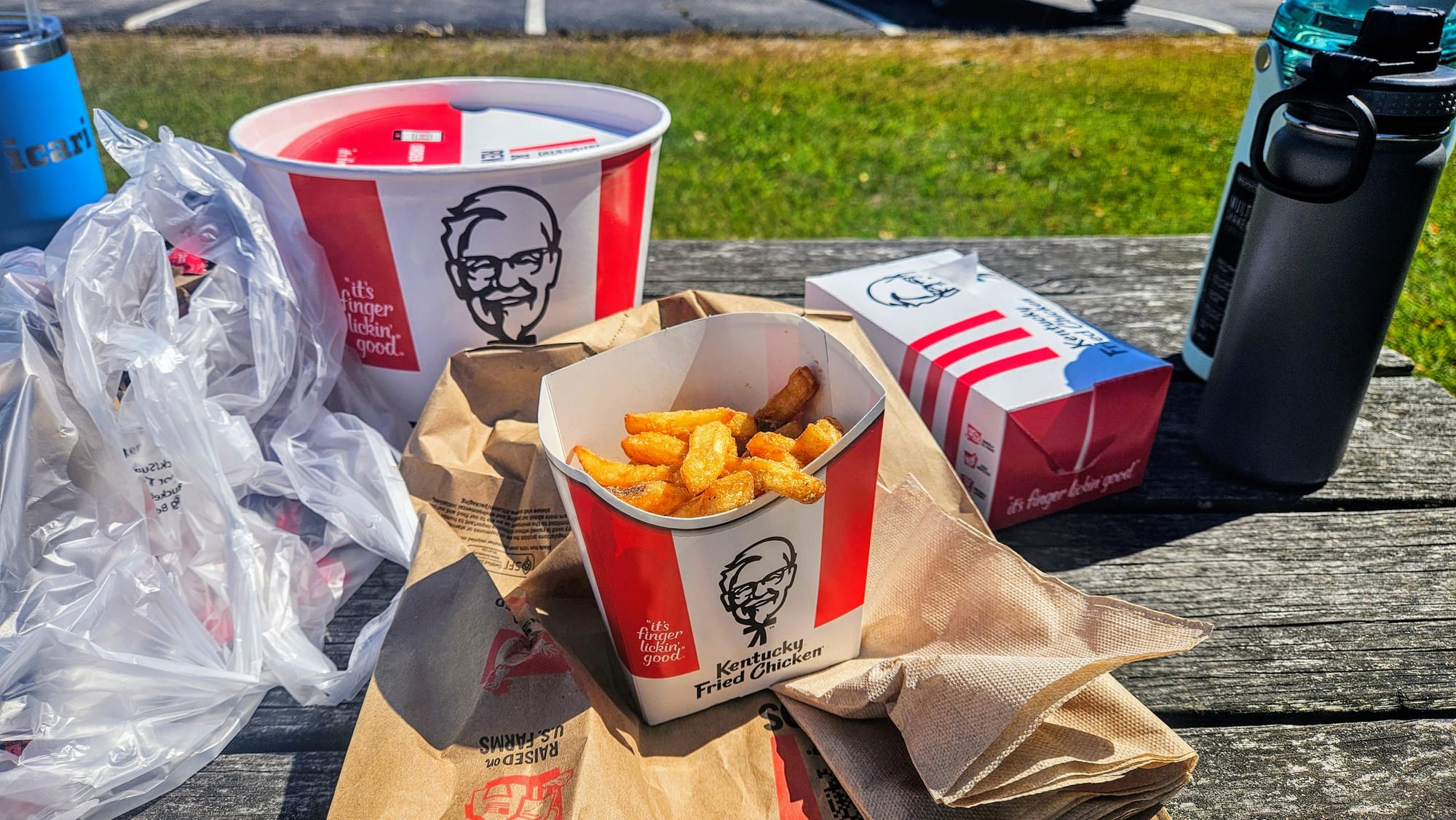
We still ideally wanted to park among some nature, so after lunch we gathered back in the truck and went over to one of the riverfront parks. It was too hot to sit outside, so we stayed in the truck and ran the AC. Even still, the sun got to me.
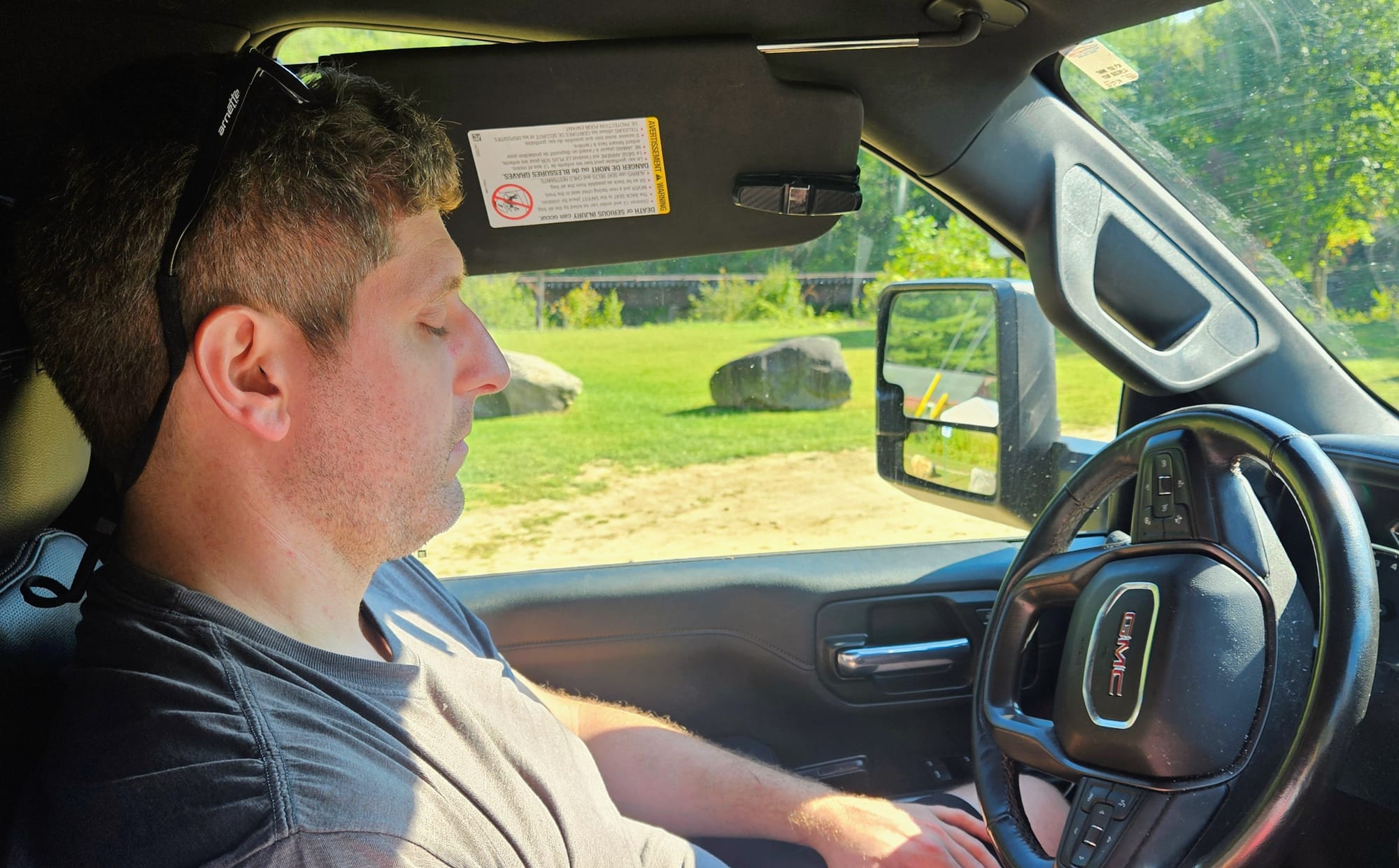
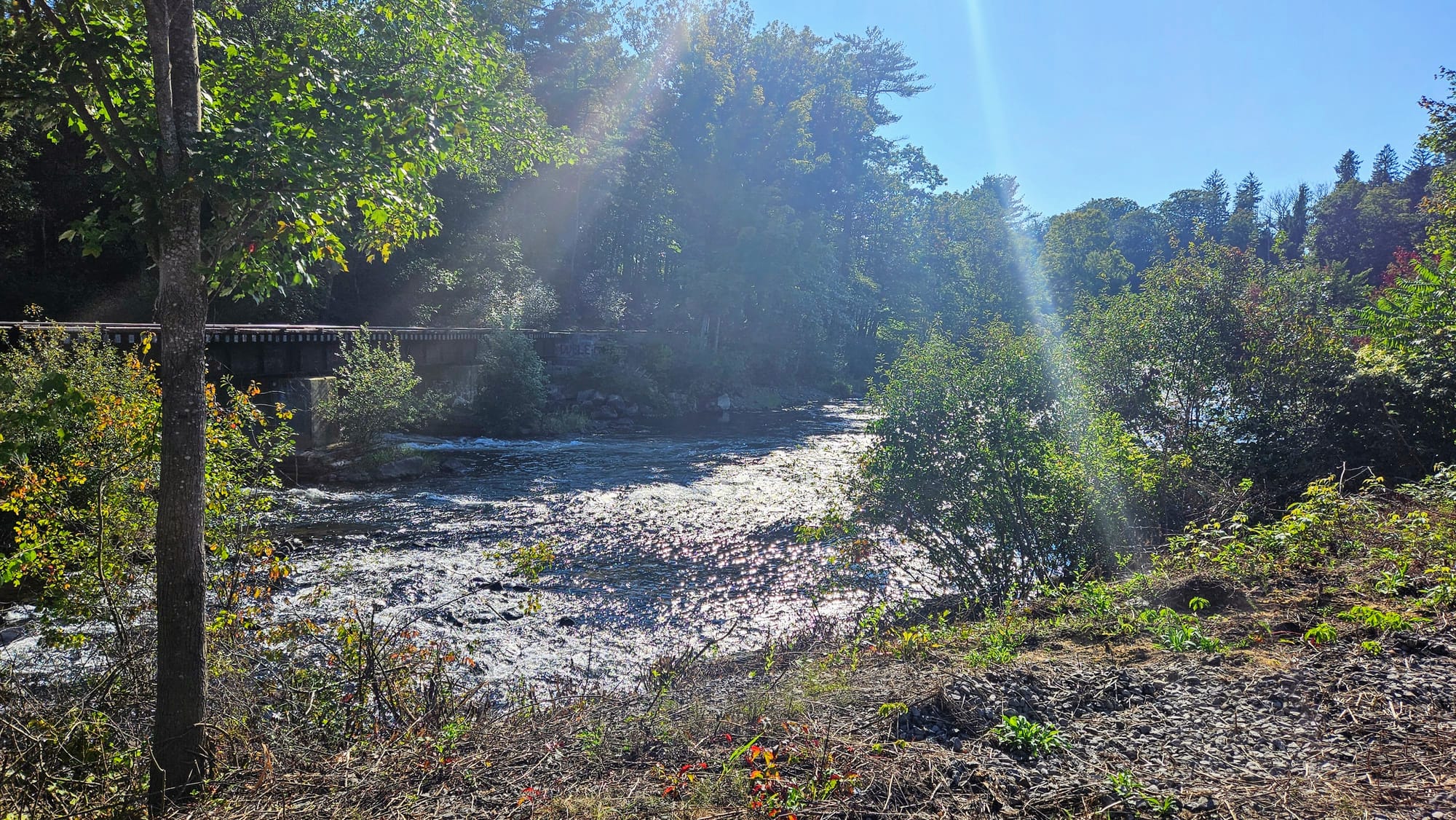
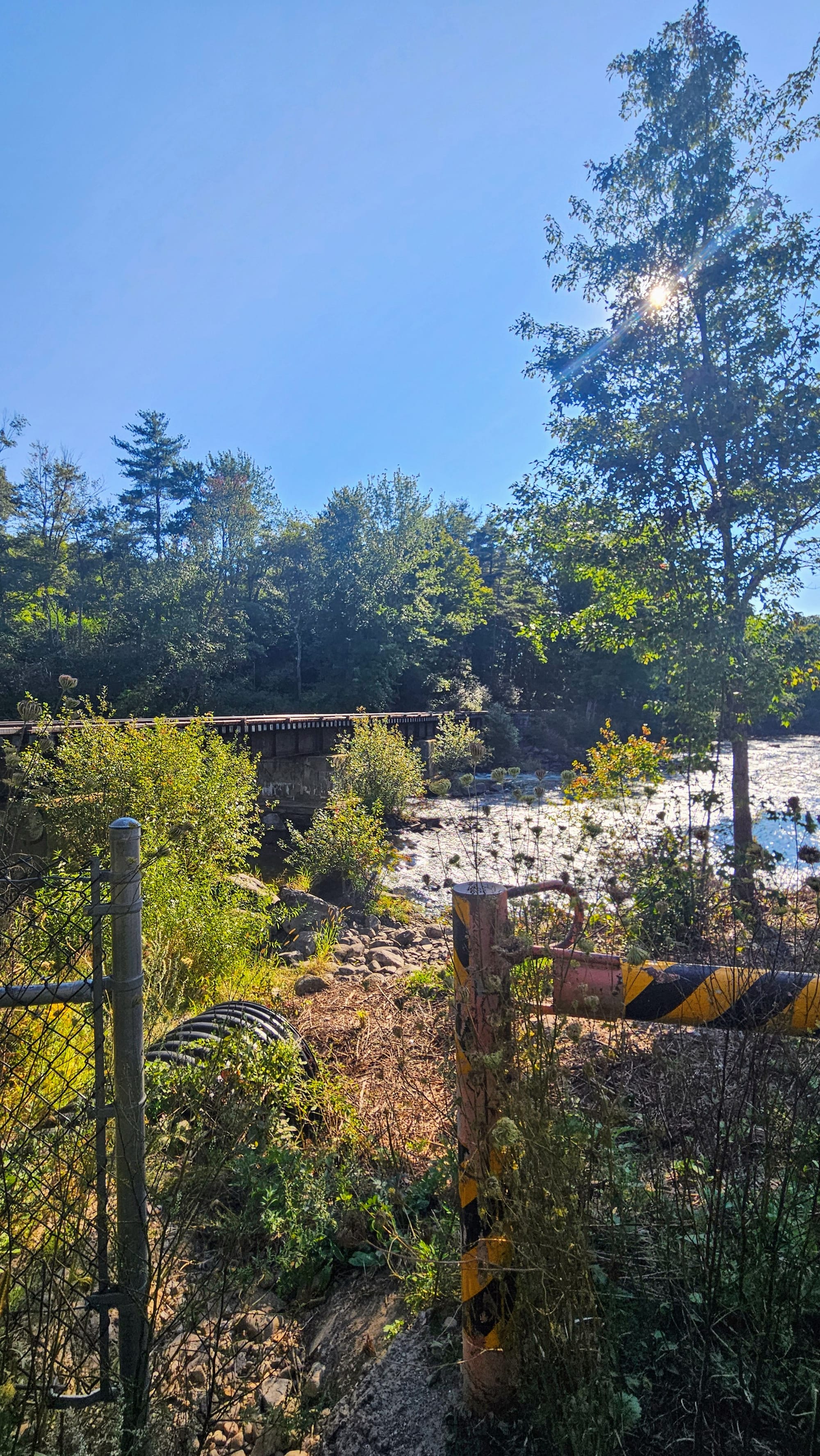
After a few hours, we got the call that the trailer was ready to be picked up. Central NH's conclusion after diagnostics was that yes, we should in fact replace both the valve and the control panel. They ordered the parts, and we let them know that we were on a time crunch because we were supposed to head even further north in NH soon. They were optimistic that they would get the parts and squeeze us in on time, but just in case, I went onto Amazon and ordered the same parts to a nearby locker. That way, we'd be able to get them installed no matter what.
Hindsight is 20/20. We were 99.9% sure that these were the parts that would need replacing, and they're not expensive. Why didn't we just buy them so Central NH could install them during the same visit? Even if that meant leaving the trailer there overnight. Sometimes an overnight displacement is less stressful because we'd be able to check into a hotel, spread out, and do work. It certainly seemed less stressful than two service appointments and two day-long displacements. But, we didn't think ahead on this one, and so all we could do was head to our campground and wait for the news of the parts arriving.
Six days later, Central NH was ready for our return. We were in the middle of our stay up near Lake Winnipesaukee, about 40 minutes away. What's worse than displacement on a travel day? Displacement on a non-travel day. We packed up what we needed to adequately secure our belongings, hitched up, and headed down I-93. Dropped the trailer off and prepared ourselves for another several hours out of the rig. Only this time, we had a plan. If we had all this time to kill, might as well go somewhere awesome. We headed north, into the mountains. We had such a busy week catching up on post-displacement/post-Labor-Day-Weekend work, that we hadn't even been up to the National Forest yet. We decided to stop for lunch and then find a scenic spot to get work done.
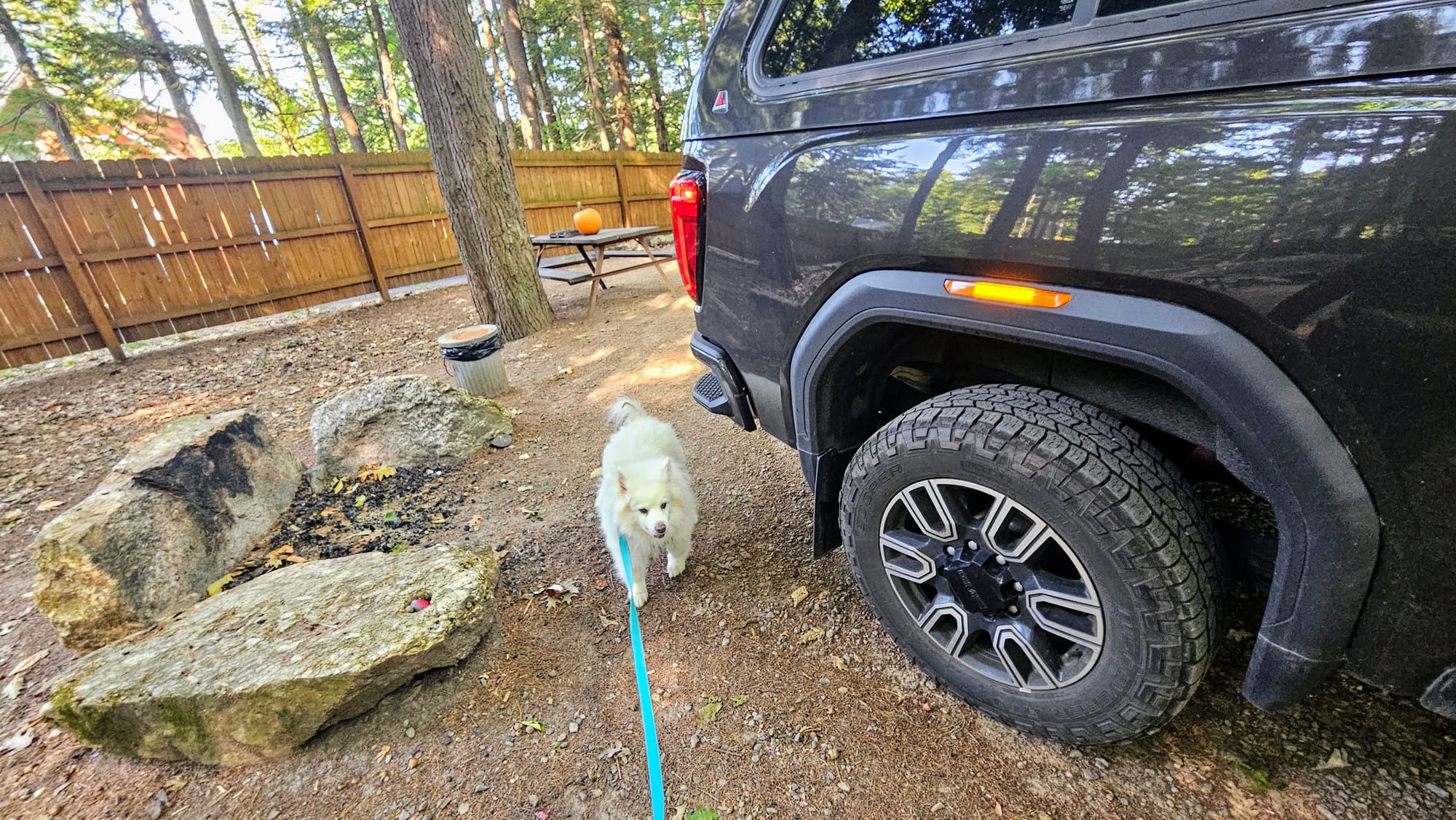
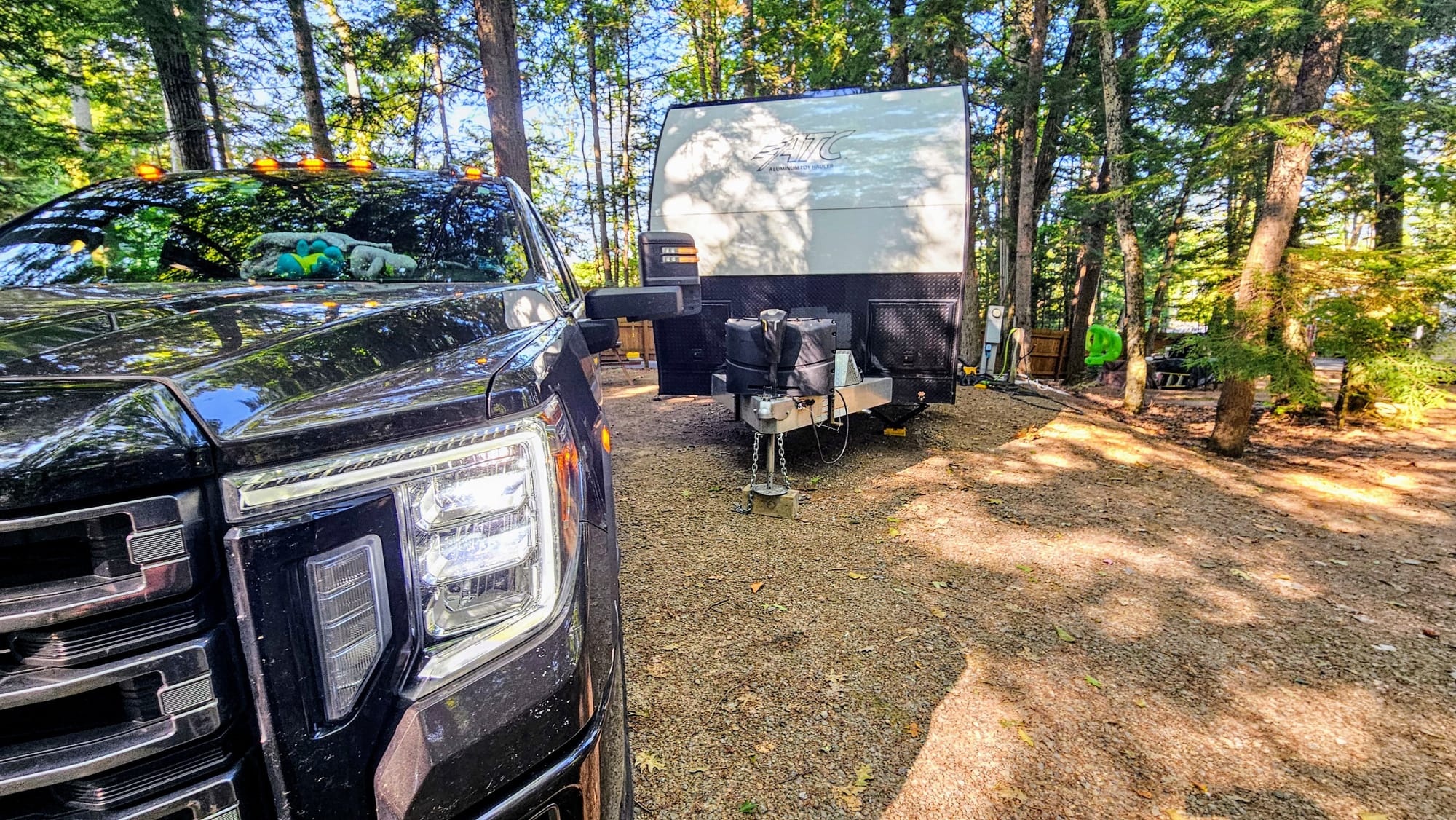
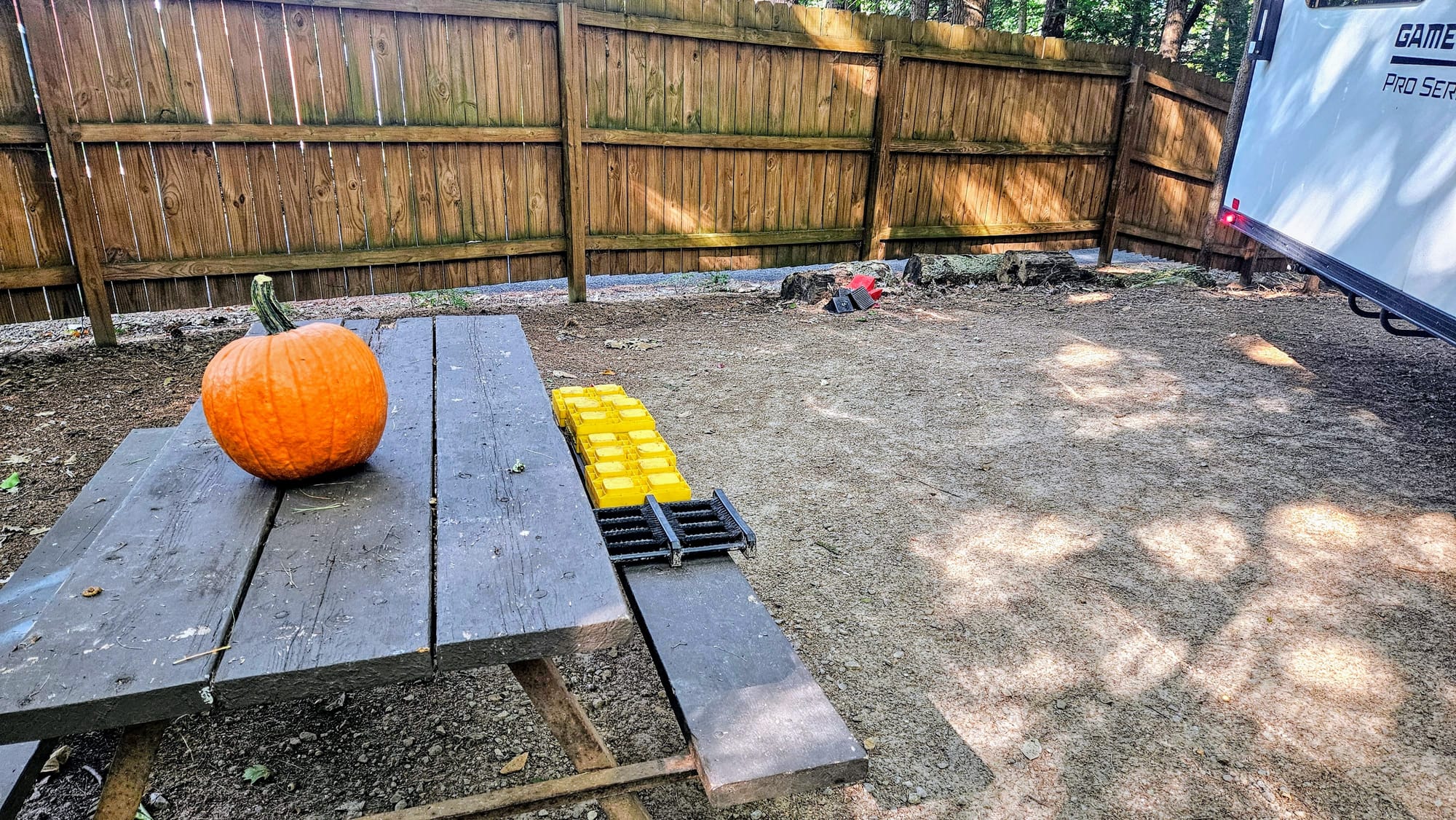
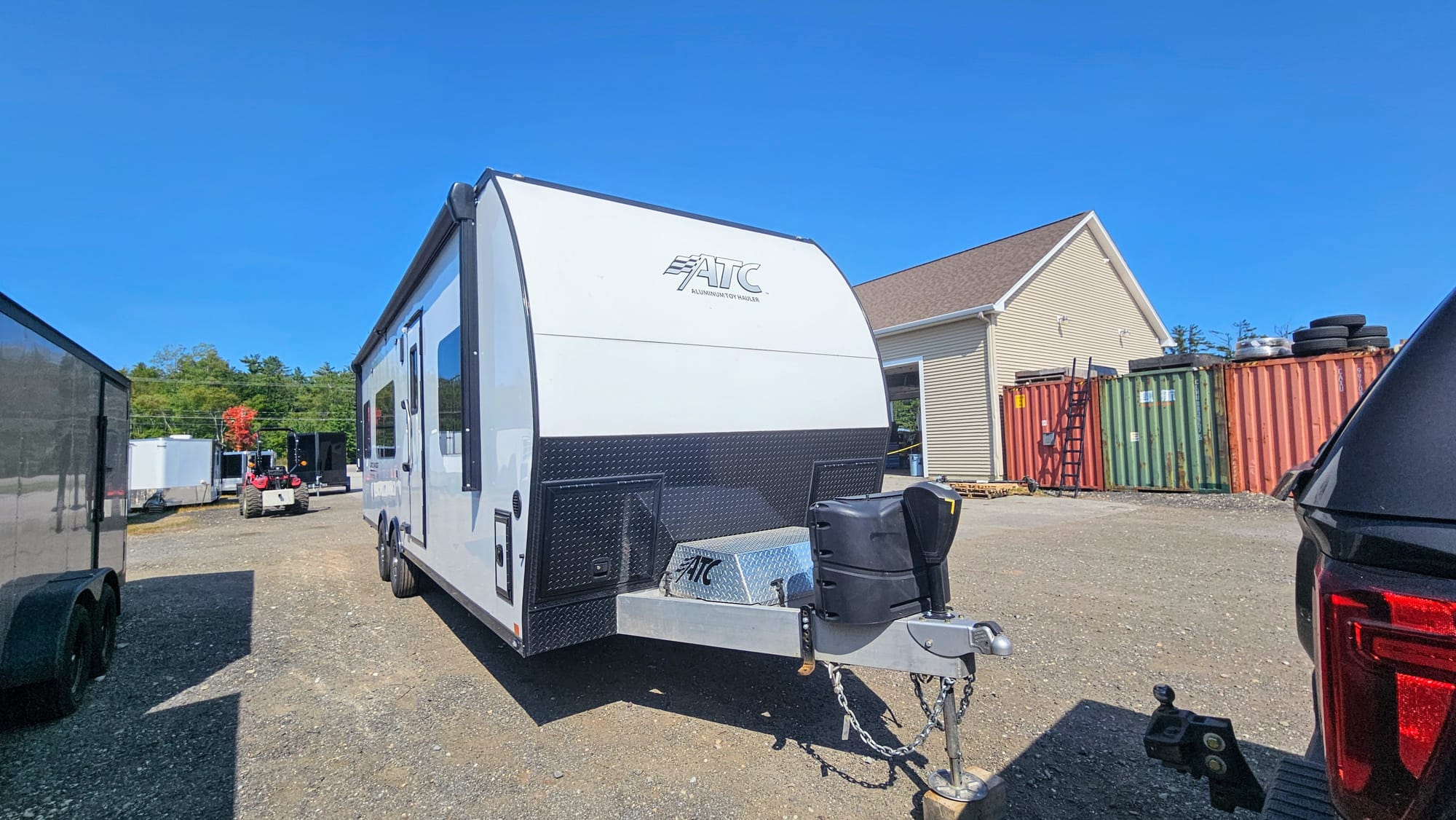
We finally got our displacement pizza (and calzone) at Enzo's in Lincoln. It's a really nice stretch of shops, restaurants, and lodges along the Kancamagus Highway. We ordered some food and sat at their picnic tables. Afterwards, we drove the Kanc, hoping to stop and do some work at one of the overlooks. Not a good choice. We had somehow forgotten that most of the road is without cell service, and we needed internet. So we took a few pictures and headed back down to civilization.

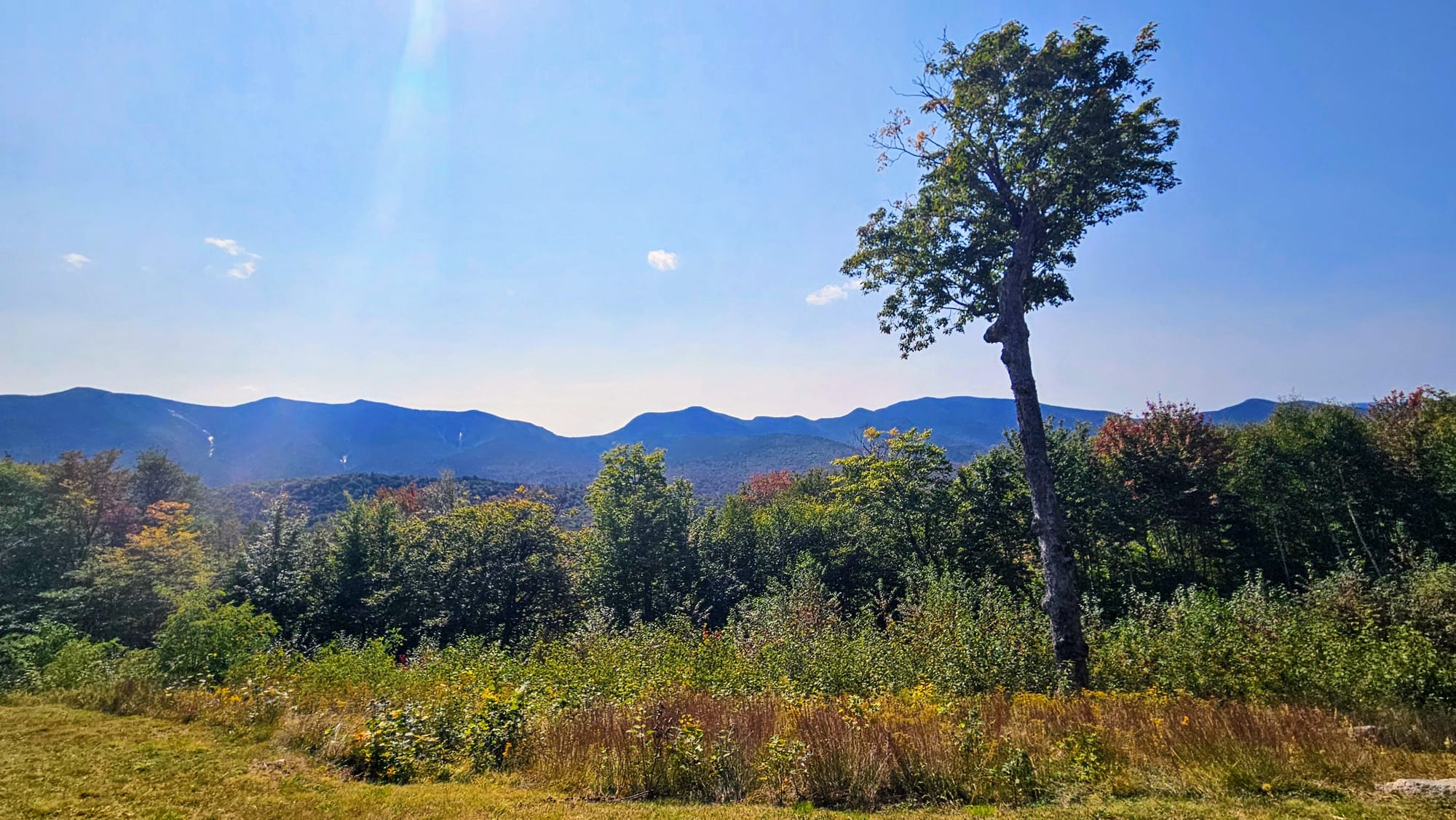
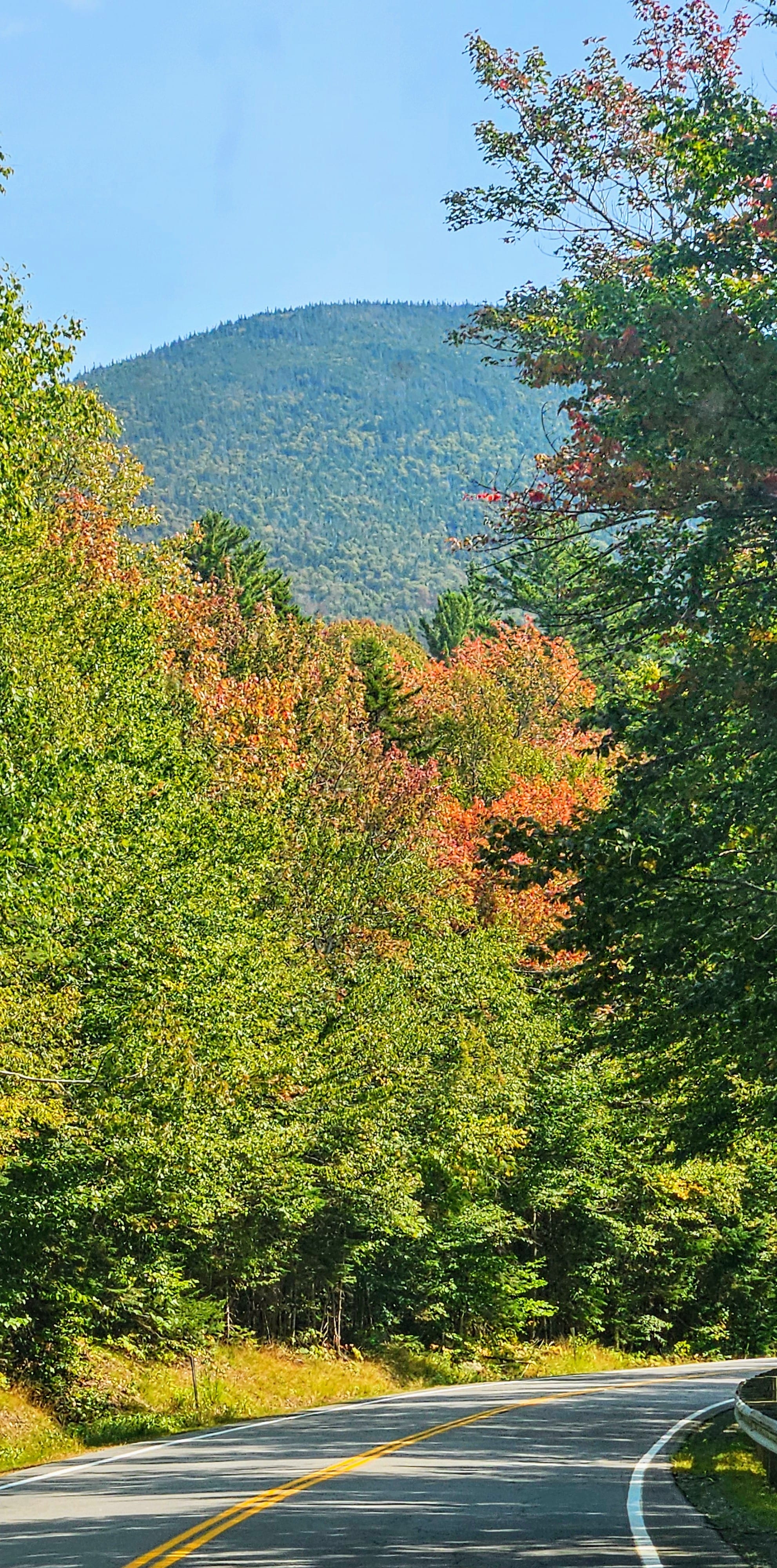
We found a park along the banks of the Pemigewasset River that had nice views, picnic tables, and even port-a-potties. We piled our stuff on one of the picnic tables, got our camping chairs, and made this park our office.
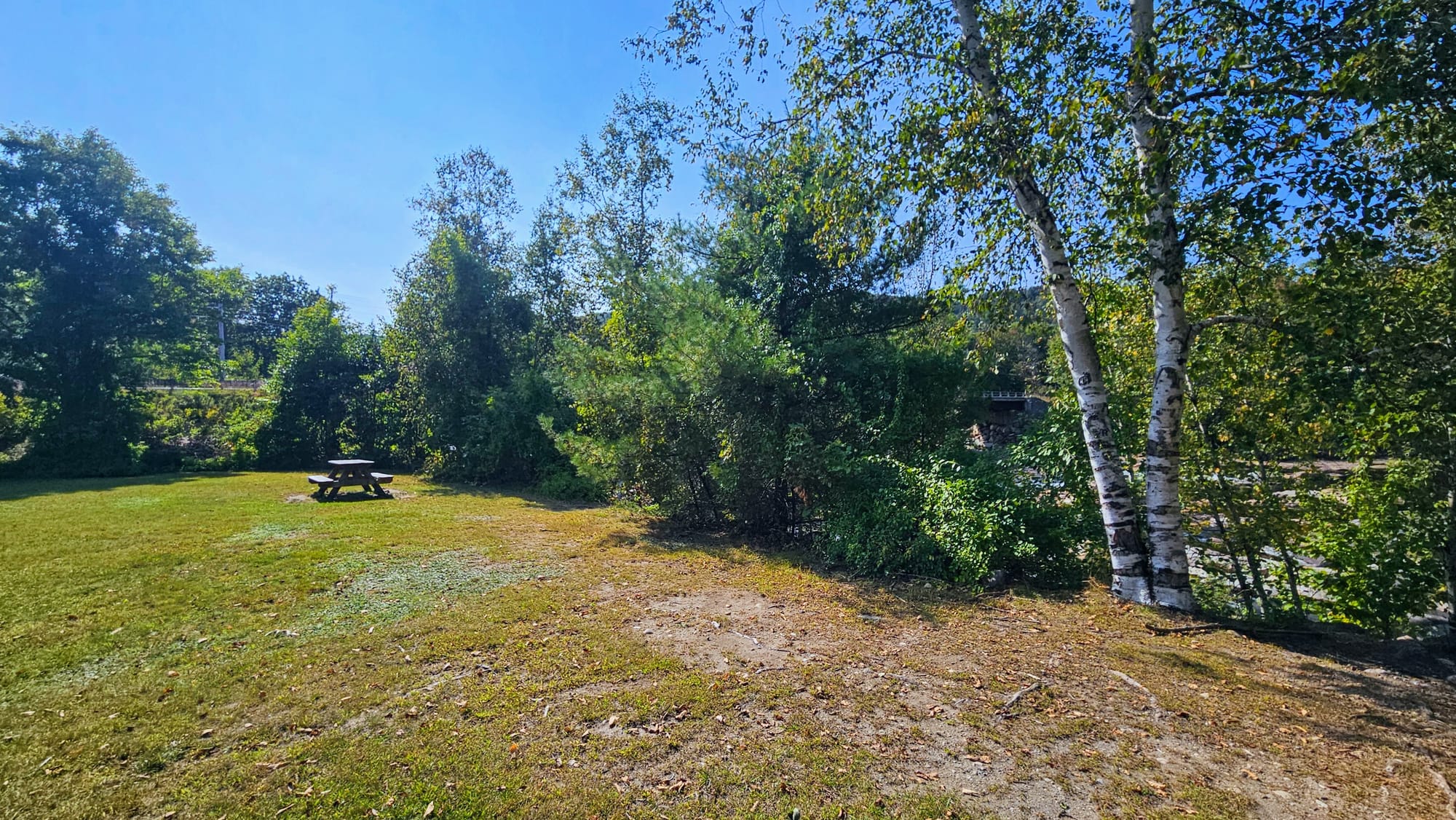
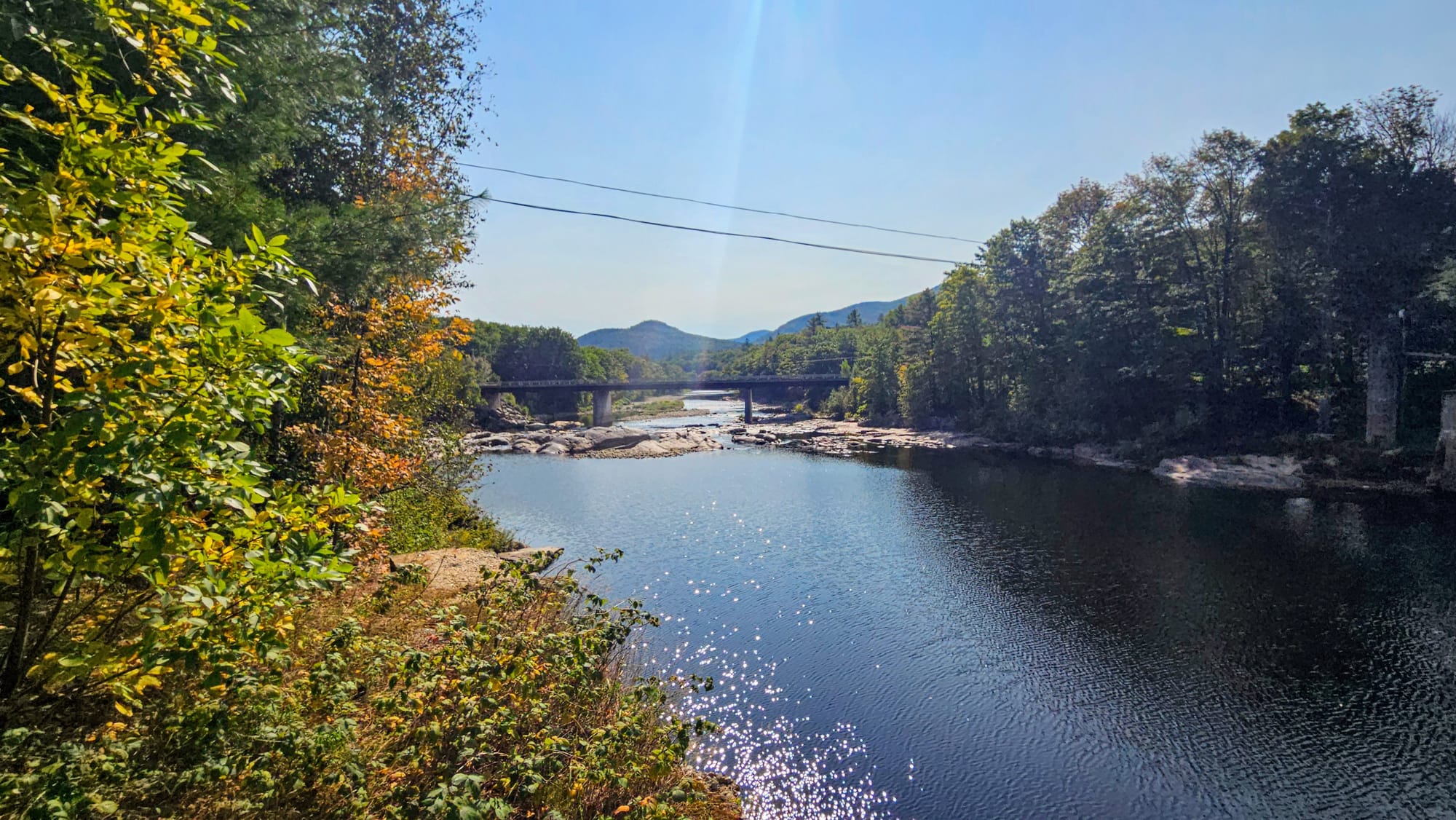
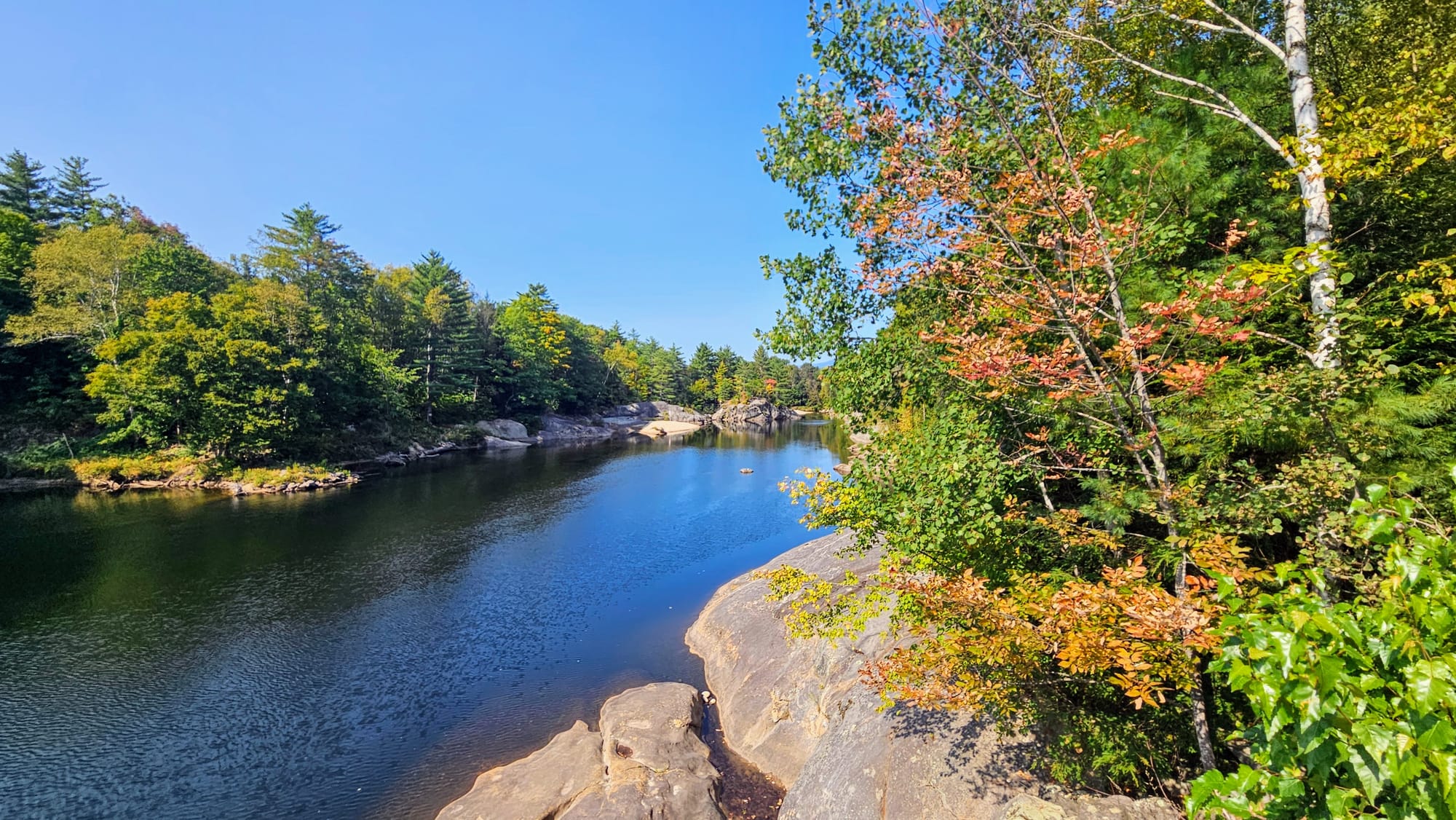
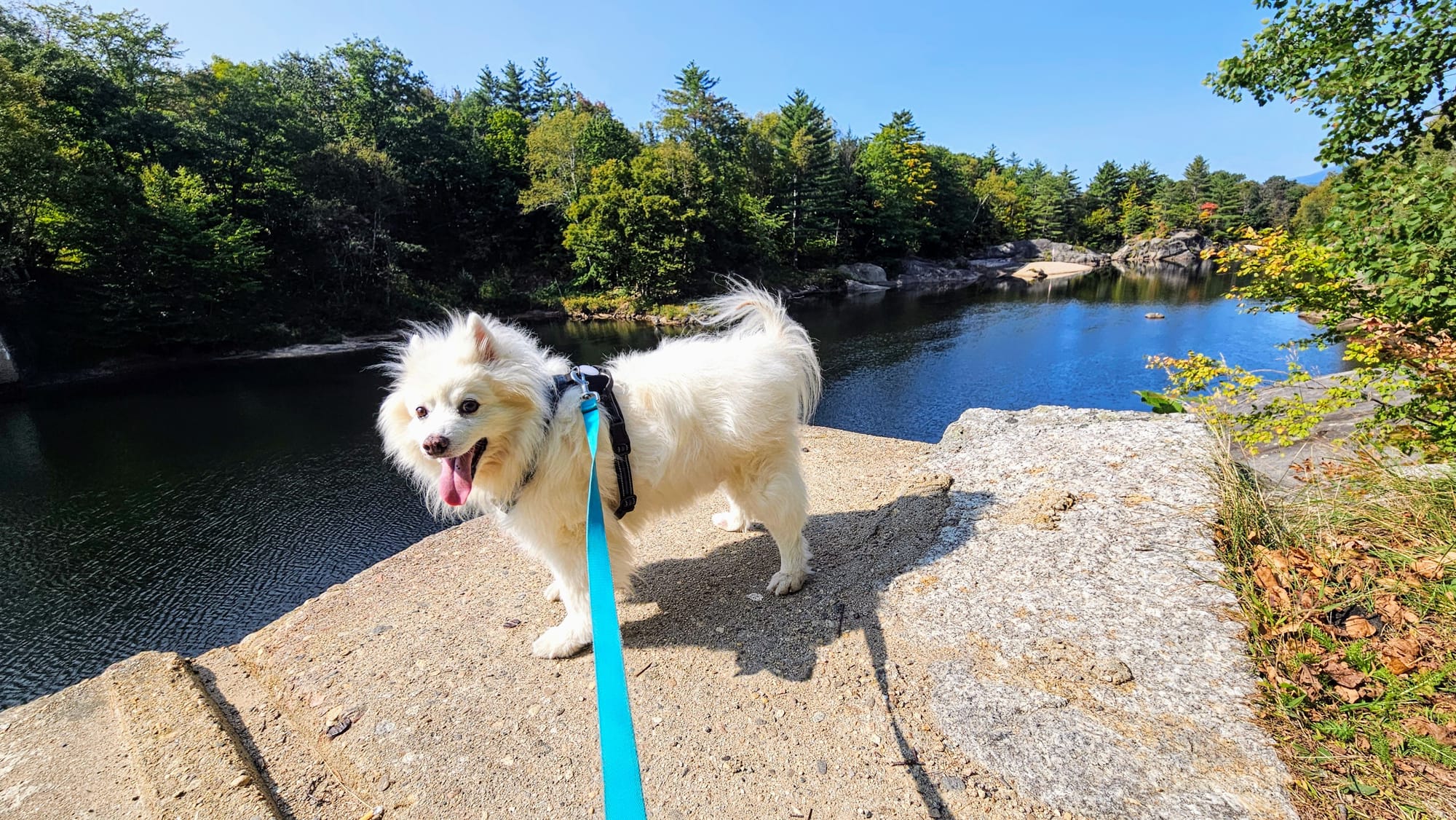
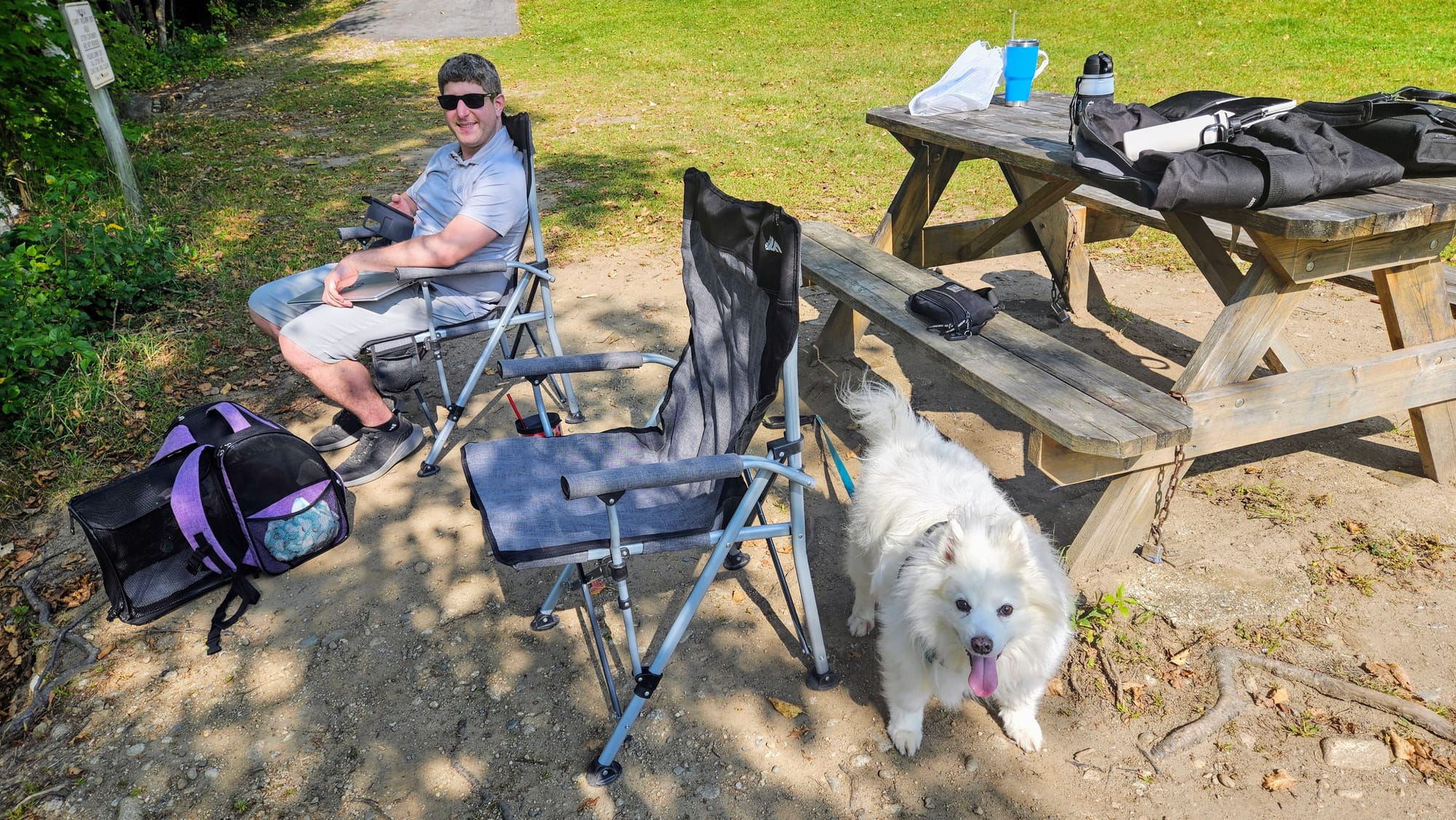
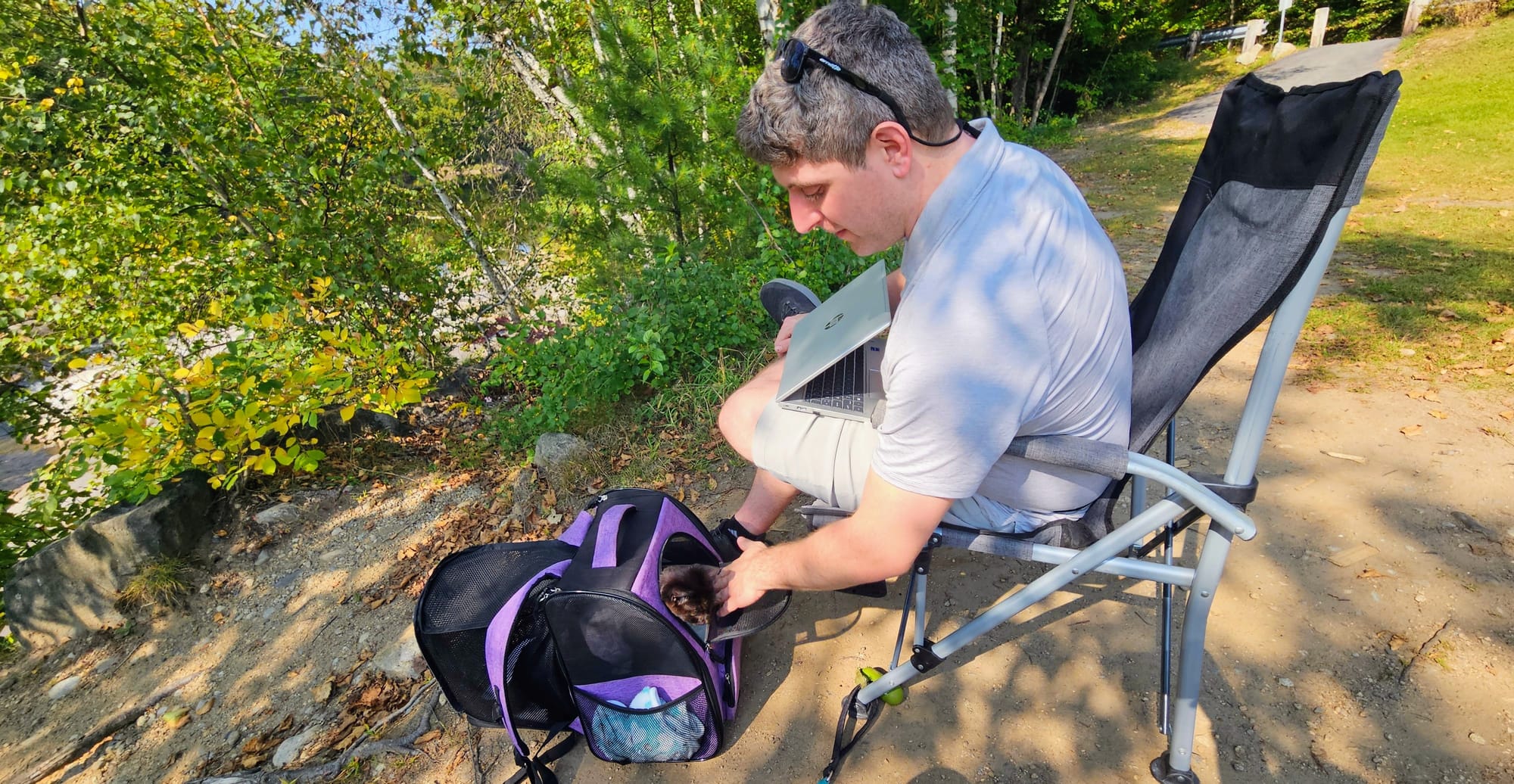
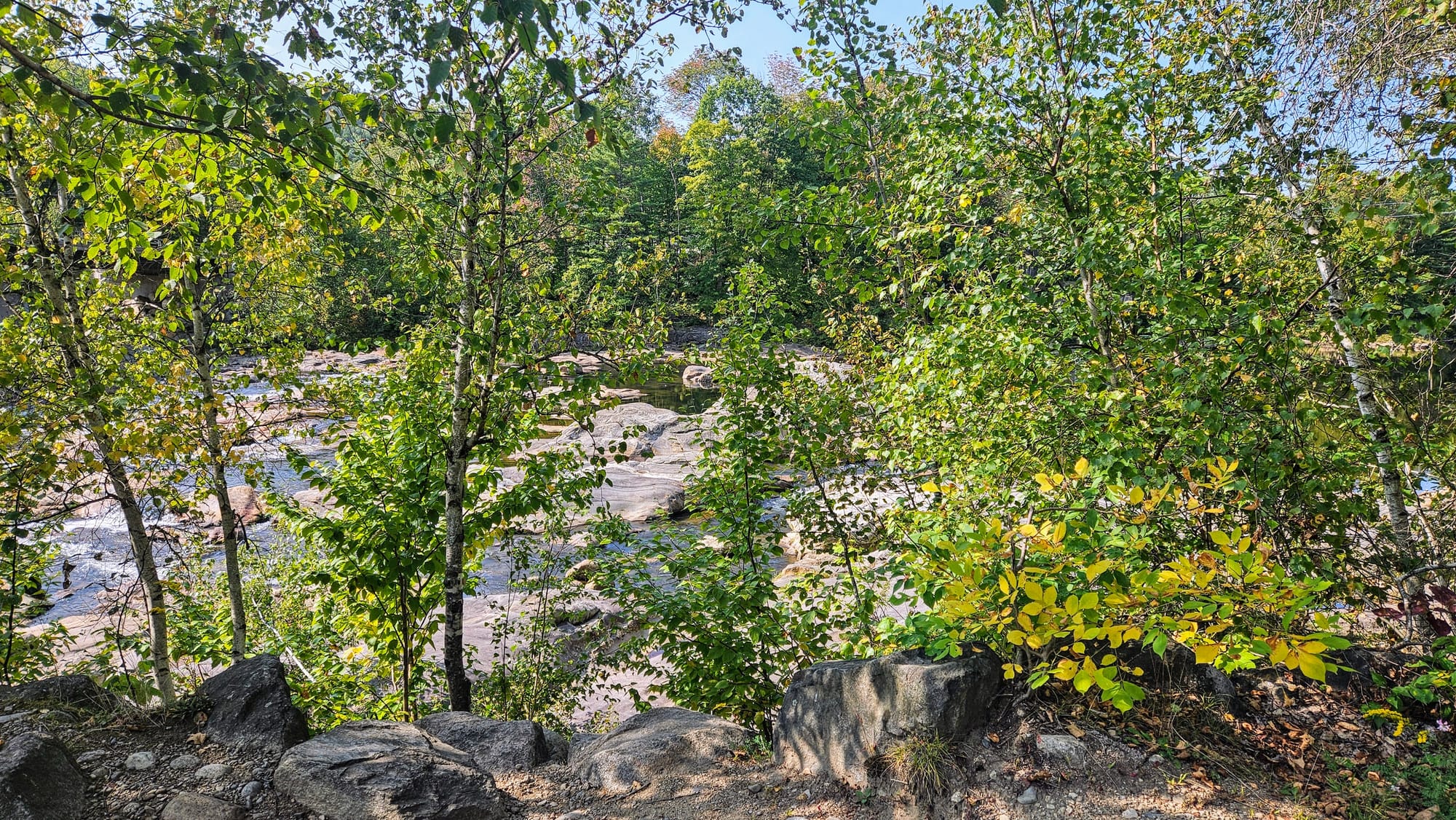
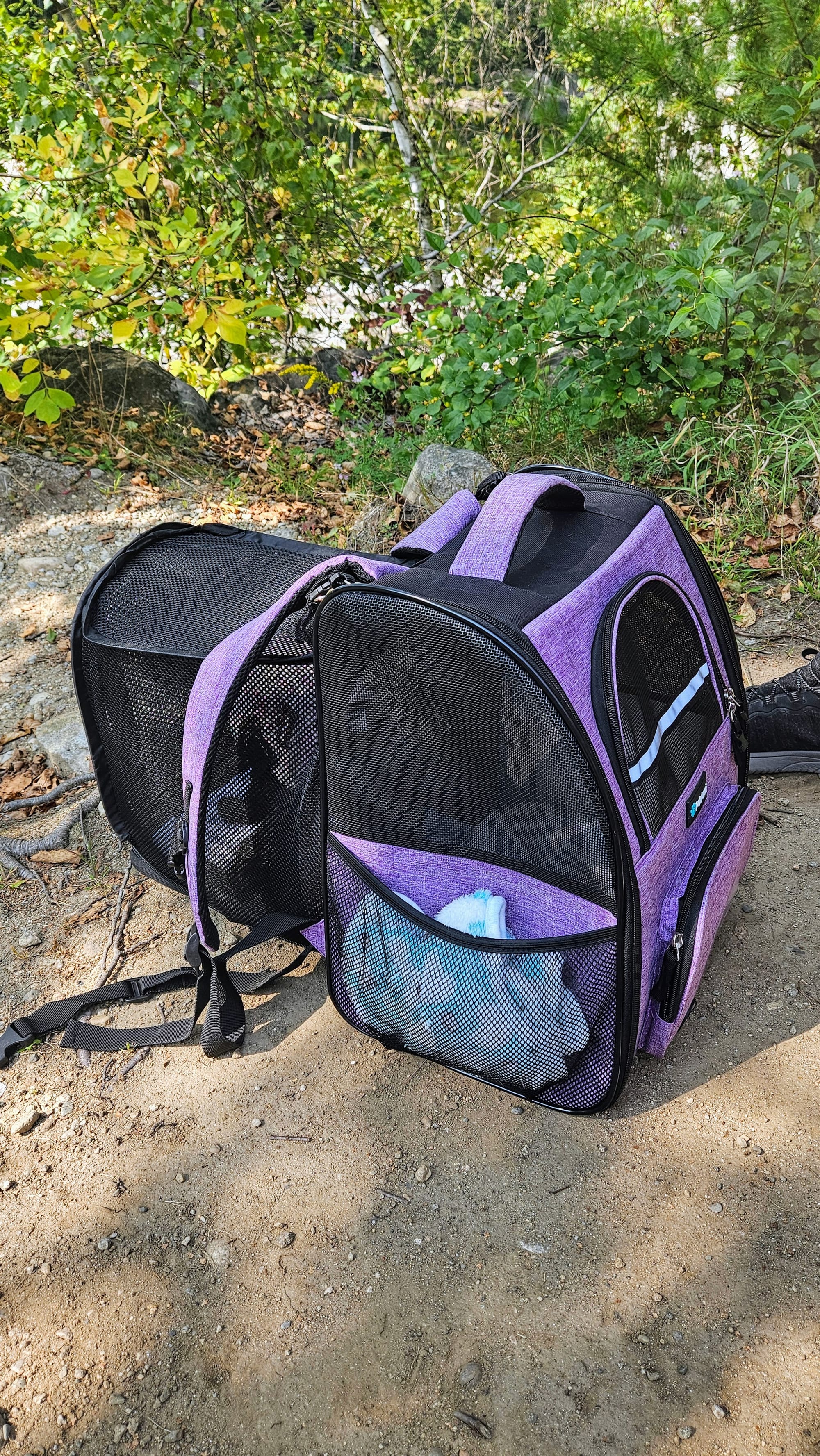
It wasn't long before we got the call from Central NH, letting us know that the furnace seemed to be working. We also tried it when we got back to the trailer, and for the first time in months, we could feel warm air coming out of the ducts! We returned to our campsite and couldn't wait to finally have heat during the cold night.
We set the furnace and headed to bed. Around 3am, I woke up and realized the heat hadn't kicked on like it was supposed to. Nicole mentioned hearing the furnace start up once during the night, but it must have short cycled and stopped working. I raised the temperature on the thermostat which started the furnace, but it was only blowing cold air.
Two hours later, Nicole was woken up by the cold, and we were back to our usual routine of priming the tanks, adjusting the thermostat, and hating every minute of it. When I was outside, as a last-ditch effort, I tried removing the Gas Stops. It seemed like the only remaining thing I hadn't tried.
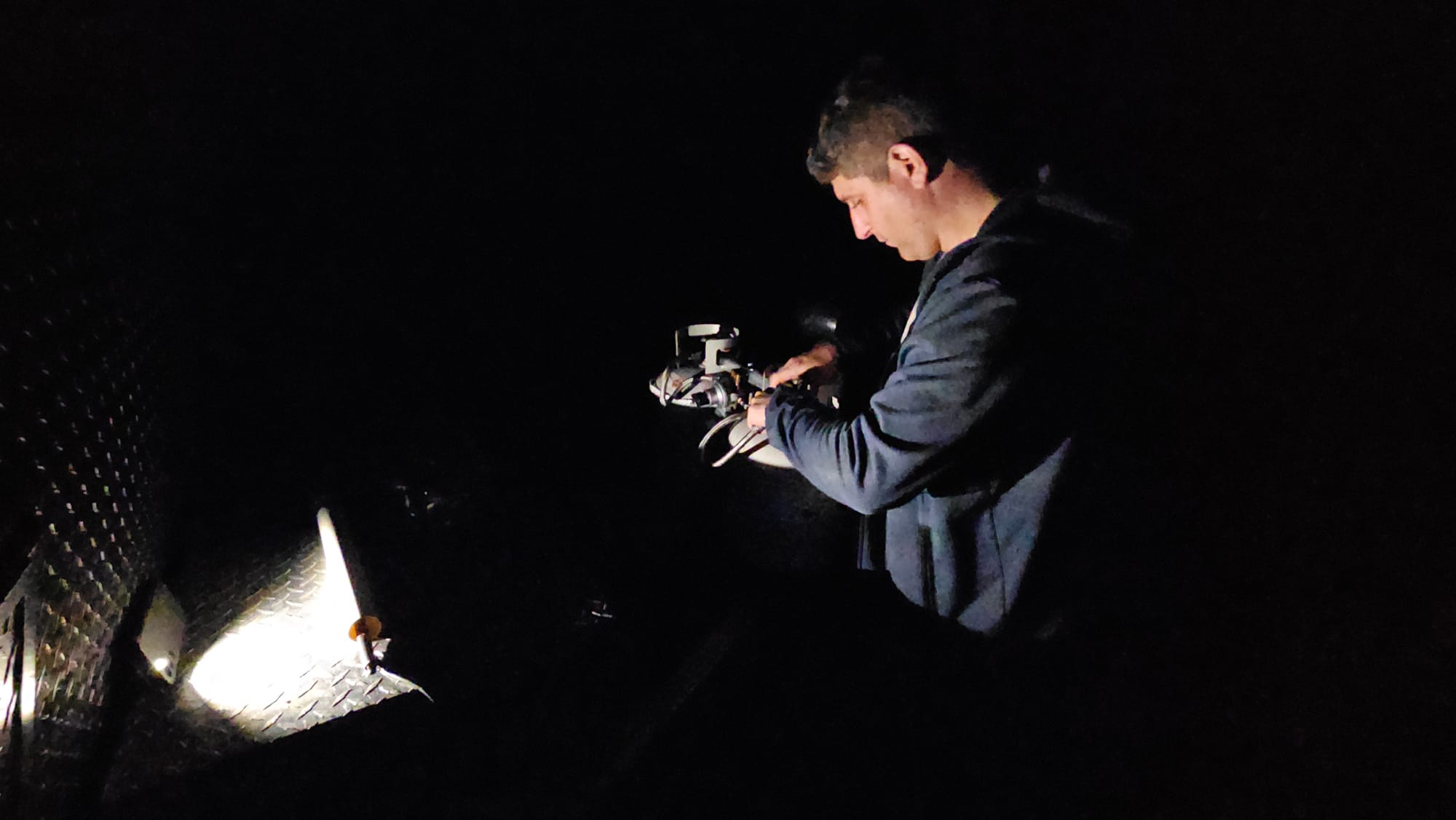
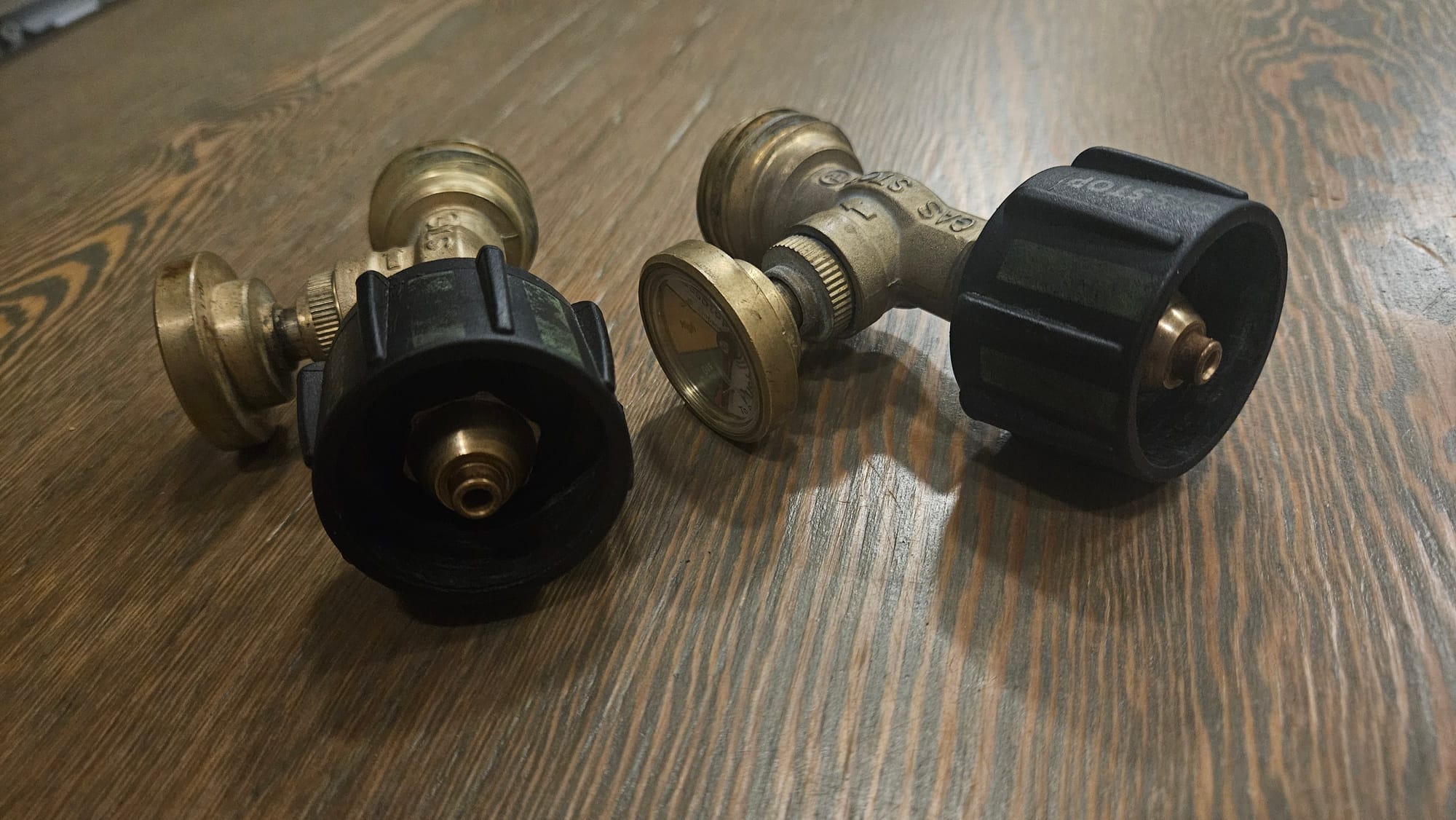
As luck would have it, the furnace lit! WE HAD HEAT!
It was a joyous three minutes. Then, everything went back to the usual level of malfunctioning. We spent the rest of the morning trying to troubleshoot and we got the furnace to light maybe one more time, but whenever we felt hot air coming out, that only lasted a minute or two.
I did some research and found out that the Gas Stops specifically say that they won't work in temperatures below 32°F. Right, because no one will need heat in temperatures that low. This was enough information where we would have thought the Gas Stops were our problem all along, only it wasn't seeming that way, because with them disconnected, we still weren't getting the furnace to work properly.
Gas Stops are one of the first essential purchases for new RVers. They do exactly what their name states: Stop the propane when there is a sign of a leak. It's an important safety measure and we certainly do not want to run our propane without them. We wondered what could be done if the Gas Stops aren't meant to work in cold weather. We were surprised that this didn't come up anywhere in the RV forums. We're not the only RVers who camp in the cold season! Was anyone else having this problem?
The Gas Stop situation would need to be resolved later, because right now we needed to go back to the drawing board and figure out the root of our furnace issues.
When Central NH opened, I called them and talked to the tech. He said that he didn't actually end up replacing the valve and only replaced the control board. He checked the valve and didn't think it was the culprit. Then, after replacing the control board, the furnace seemed to ignite. While we understand the logic here, we were not happy. It's really hard for us to be displaced so often. It's not like we're dropping our trailer off and then going back home for the day! If they had called and asked, we would have said to replace the valve anyway, just for good measure. Now we had paid for an appointment that didn't solve our problem. Between our two service appointments and our parts, we had already racked up a cost of $1000, and at this point there was no solution in sight.
Because the tech didn't think the valve was the issue, he advised us to swap out our propane tanks for new ones. Perhaps ours had moisture in them. All 3, though? But hey, it was worth a shot. We went to the nearby hardware store and swapped them out. While we were doing this, we stopped by the Amazon locker and picked up the parts we ordered. We had valve in hand in case we needed it, which we fully anticipated to at some point in the near future.
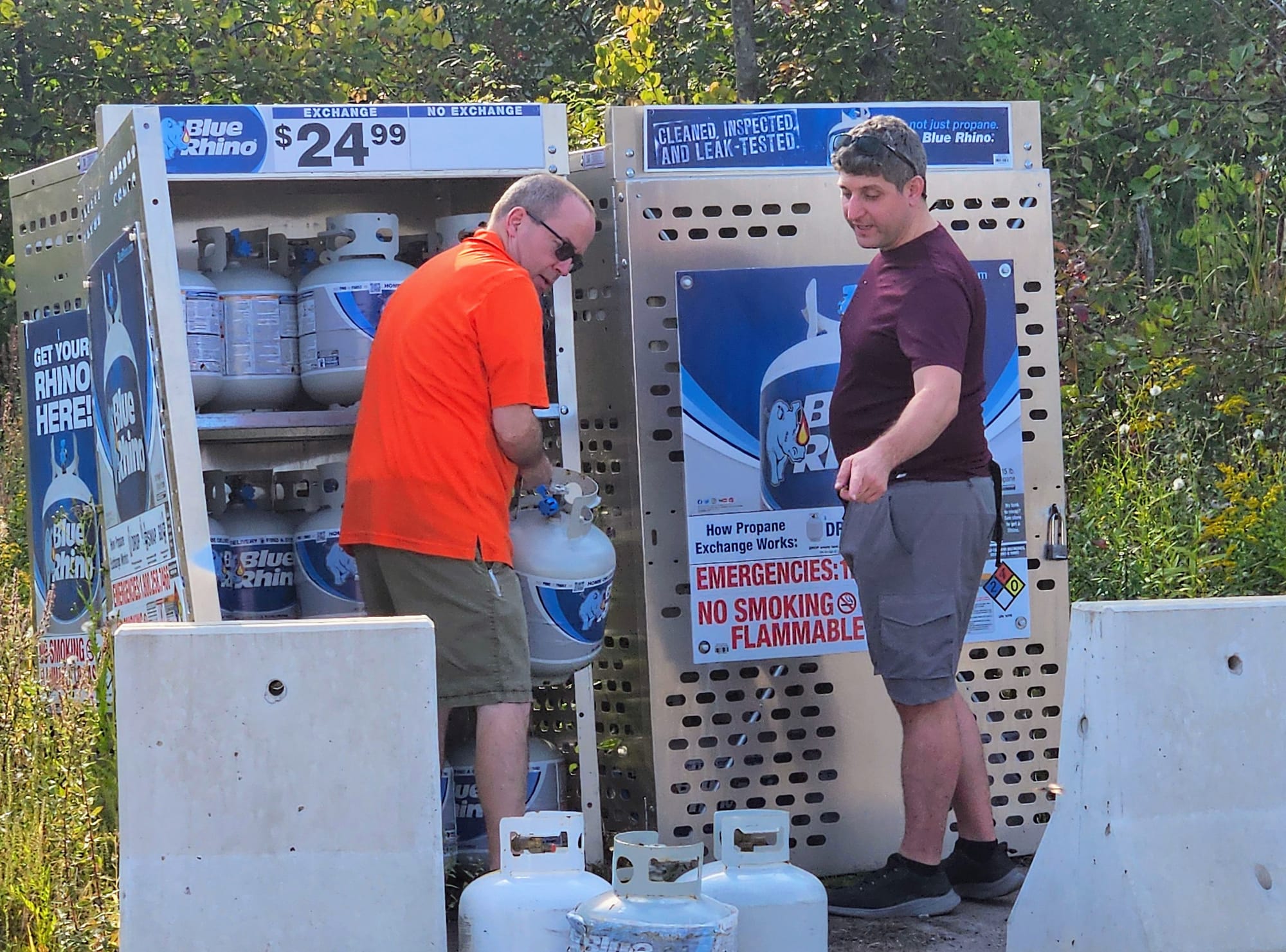
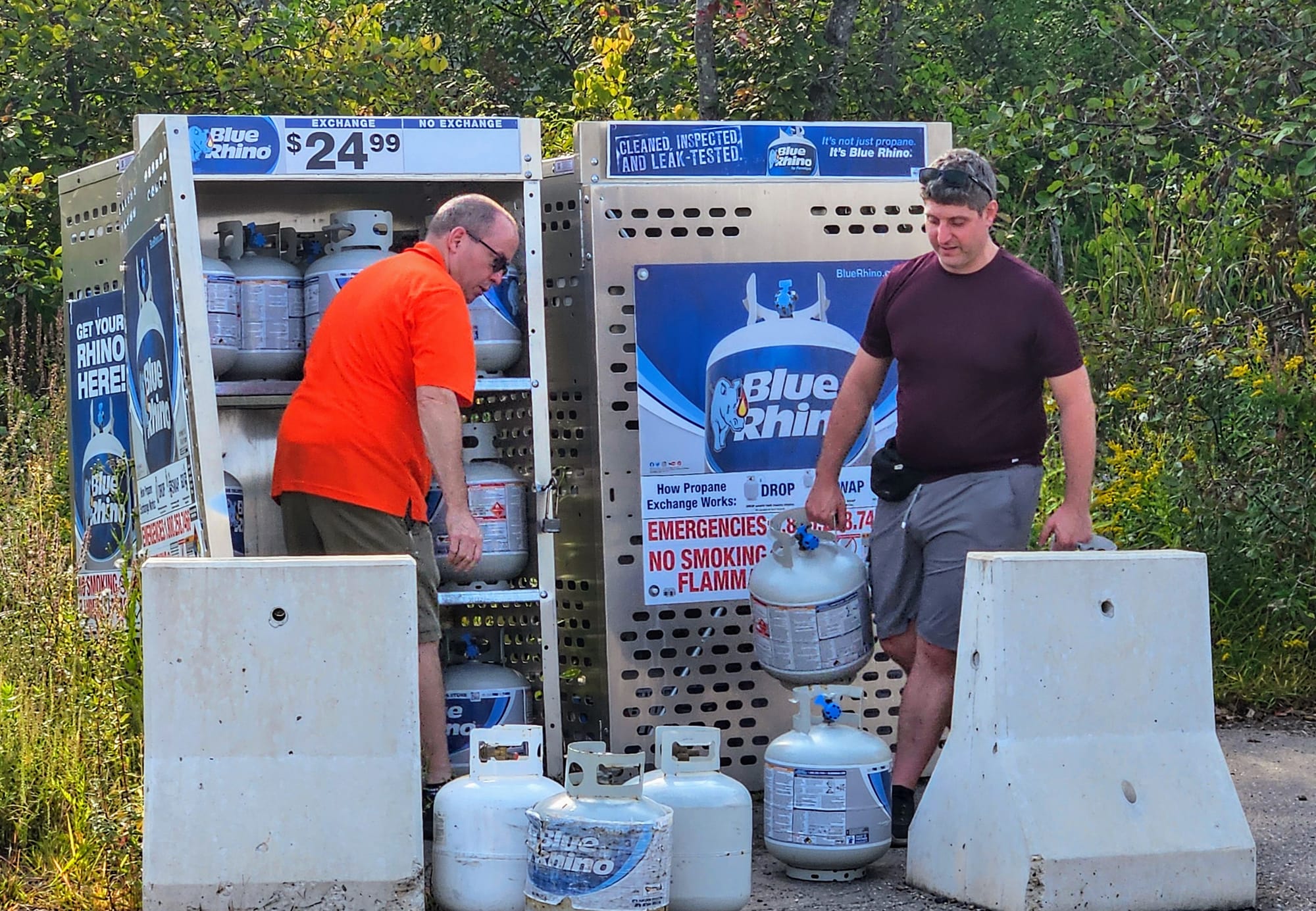
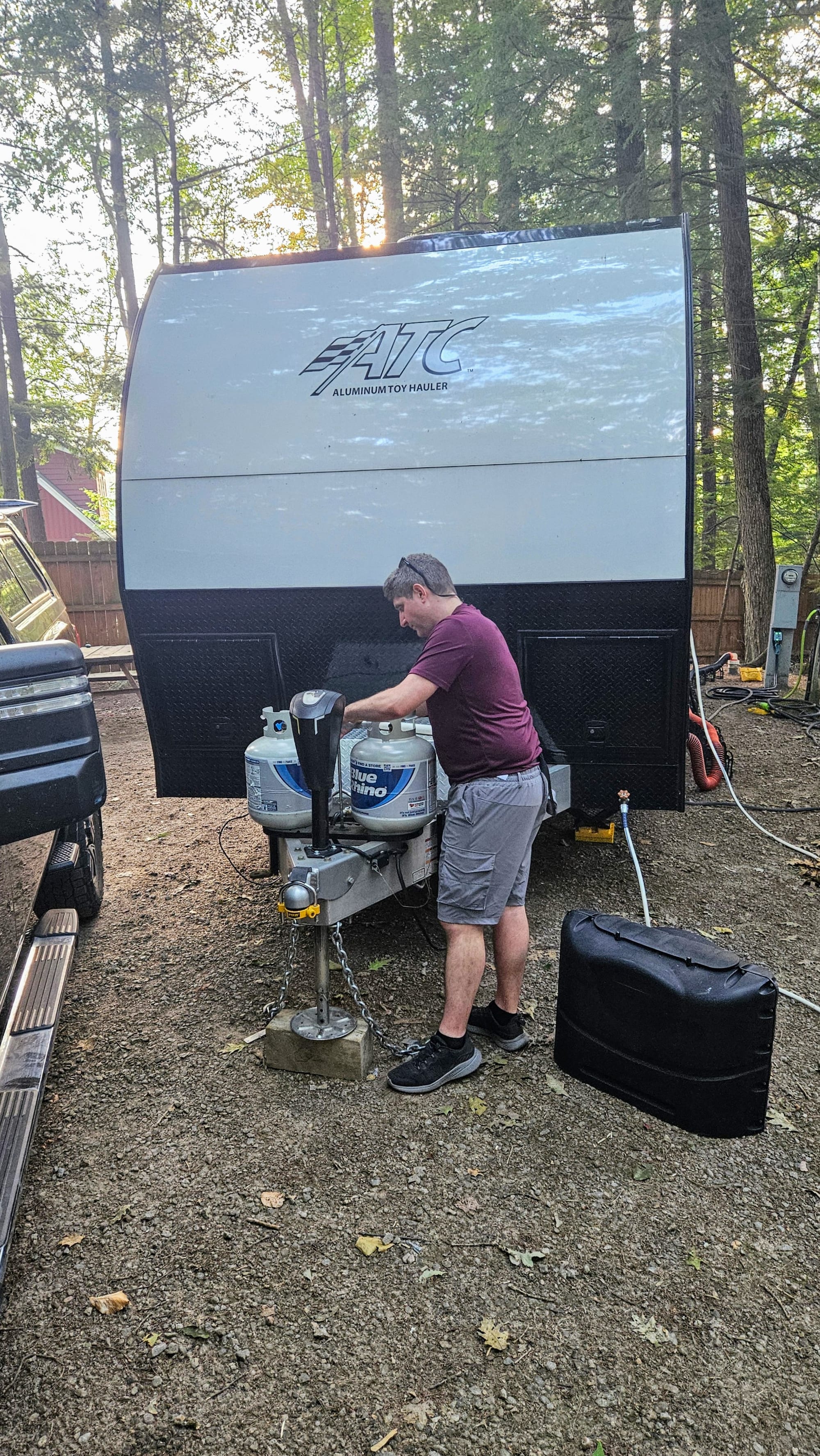
That night, temperatures dropped well into the 40s, and just as our pessimistic selves expected, we had another very chilly sleep. The next day, we called Central NH again, but the tech had called in sick and no one else knew what to suggest. We could form some conspiracy theory and ask, was he really out sick or was he running and hiding from our inevitable call? We'll never know. All we knew now was that we were due to head north to Lancaster, NH the following day, and our rig still didn't have heat.
We weren't sure if we would need to cancel our booking and stay further south, but when we checked the forecast, Lancaster was due to get a heatwave. Days would reach in the 80s, and while the temperatures were supposed to drop significantly each night, they wouldn't drop any lower than we had already been experiencing. We decided to stick with our travel plans and scrounge around for someone who could help us – a repairman, tech, mechanic, or anyone who knew anything about propane furnaces! It was a big ask, though, to see if anyone would have last-minute availability on a Saturday. We expected to need to stick out our Lancaster stay and take our rig somewhere on our next travel day, only then we'd really be on a time crunch.
You see, our little saving grace in this whole situation is a pair of electric space heaters. One we've had for a while, and I bought a second one when all this furnace nonsense came to be. They work well, but we do not leave them running unattended. So this means we keep them off when we sleep, aka when the temperatures are at their coldest. Most nights, we would wake up freezing, start the space heaters, let the rooms warm up, shut them off again, and then go back to sleep. While it doesn't make for quality sleep, it does help. However, they draw a lot of power. We've had electric hookups at our NH campsites so far, but after Lancaster, that would no longer be the case. We didn't even want to think about being in a primitive campsite...up near the Canadian border...where temperatures had dipped below 40°F some nights. While running the space heaters would be possible, they'd deplete our batteries pretty fast, and this campground has limited generator hours.
It wasn't looking good. We needed to find a service appointment in the boonies of NH. If no one could fit us on a Saturday, we'd be looking at the following Friday, the same day we'd be headed to this primitive campsite up north. We would need a lot of lucky breaks if we were going to be able to continue our travels as planned. This was going to be tough.
To be continued.
